DOWNLOAD NEWS 2015/9
By Brian Wilson
DL News 2015/8 is here
and the index to earlier editions is here.
An article on the consequences of the exponential rise in streaming
and consequent decline in downloading is chiefly relevant to the popular
music market but I’ve included a link to it
here.
More important news for lovers of classical music is that one of those
streaming sites, Naxos Music Library, has added recordings from the
Universal Classics stable: Decca, including some ex-Philips recordings,
DG and ASV. It would be better still if Naxos could negotiate adding
those labels to their new classicsonlinehd.com for streaming in lossless
sound.
Index 2015/9
ADAM Giselle – Wolff (+ COUPERIN)_Beulah
ALBÉNIZ Piano Music Volume 6_BIS
ARNOLD Scottish Dances ; Symphony No.3 – Arnold_Naxos
Archives and HDTT
- Symphony No.2, Beckus – Arnold_Naxos Archives
- Symphony No.4 – Arnold_Lyrita
BACH C.P.E. Bach vs. Haydn _Accent
- Flute concertos - Alexis Kossenko_Alpha
- Sonatas for keyboard and viola da gamba – Boulanger (+
GRAUN, HESSE)_Alpha
BACH Birthday Cantatas – Suzuki_BIS
- Brandenburg Concertos - Café Zimmermann_Alpha
- Cello Suites - Bruno Cocset_Alpha; Matt Haimovitz_Pentatone
- Cello Suites, Sonatas for Gamba and Harpsichord_Arcana
- Goldberg Variations - Céline Frisch, Café Zimmermann_Alpha
- Missæ Breves Bwv234 and 235 - Ensemble Pygmalion_Alpha
BERLIOZ Symphonie Fantastique, Carnaval Romain,
DEBUSSY Faune, la Mer, Images, RAVEL
Ma Mère l’Oye – Suite, Pictures, Boléro, Pavane, Rapsodie
Espagnole, La Valse, POULENC 2-Piano Concerto, Suite Française,
Concert Champêtre – Immerseel_ Alpha
BERNSTEIN Missa Brevis, Symphony No. 3 ‘Kaddish’, The
Lark – Alsop_Naxos
BIBER Mensa Sonora _Chandos
- Missa Salisburgensis - Savall_Alia Vox
- Rosenkranz Sonatas_BIS_Channel Classics;_Pan Classics;_Arcana
- Sonatæ tam aris, quam aulis servientes_Hyperion_Chandos
BLISS Bliss conducts Bliss _Lyrita
- Morning Heroes; Hymn to Apollo – Davis_Chandos
- Hymn to Apollo; Checkmate Suite, Clarinet Quintet,
Music for Strings, Pastoral_Chandos
BRAHMS Clarinet Quintet – Emma Johnson (+ ZELENKA Clarinet
Trio)_Nimbus
BRUCKNER Symphony No.1 – van Zweden_Challenge Classics; Skrowaczewski_Oehms;
Tintner_Naxos
CAVALLI Heroines of the Venetian Baroque - Maria Flores_Ricercar
CHAPLIN Modern Times – Brock_CPO
CODAX Cantigas – Biffi_Arcana
CZERNY Music for flute and piano – Kazunori Seo/Makoto Ueno
_Naxos
- String Quartets – Sheridan Ensemble_Capriccio
- Symphonies Nos. 2 and 6 – Kaiserslautern Symphony Orchestra_Haenssler
DEBUSSY Faune, la Mer, Images – see BERLIOZ
DELIUS American Masterworks – Holten_Danacord
FITELBERG String Quartets, Serenade, Sonatine, Nachtmusik
- ARC Ensemble_Chandos
FITZENHAGEN Cello Concertos – Gerhardt (+ TCHAIKOVSKY
Rococo)_Hyperion
FORTMANN Symphony No.2, NELSON Capriccio for violin
and orchestra, LIEUWEN Astral Blue, PATTERSON (arr.)
Lincolnshire Posy_Divine Art Métier
FOSS Symphonies – Boston Music Orchestra_BMOP
FRANCHOMME The Franchomme Project – Dubin_Delos
FRESCOBALDI Toccate – Alessandrini_Arcana
GADE Symphonies - Järvi_BIS; Hogwood_Chandos
GLAZUNOV Symphonies – Fedoseyev_Amazon; Otaka_BIS
- Symphonies 1-6 and 8, etc. – Polyanksy_Chandos
- Violin Concerto – see PROKOFIEV
HANDEL Fireworks Music, Concerti a due cori –
Zefiro/Alfredo Bernardini_Arcana
HANDEL, TUMA, FASCH and FUX Trio Sonatas (The Dresden
Album)_Audax
HARTMANN Concerto funèbre, SHOSTAKOVICH Unfinished
Sonata for Violin and Piano, WEINBERG Concertino, Op.42; Rhapsody
on Moldavian Themes – Roth_Challenge Classics
HARTMANN Concerto funèbre, Solo works – Ibragimova_Hyperion
HAYDN Bach vs. Haydn _Accent
- Die Schöpfung – Herreweghe_PHI
HOOFMESSTER Symphonies - Griffiths_CPO
KUULA South Ostrobothnian Suites – Segerstam_Ondine
MONTANARI Violin Concertos - Ensemble Diderot_Audax
MONTEVERDI, MARAZZOLI Combattimenti ! - Le Poème Harmonique_Alpha
MOZART Piano Concertos 8, 11 and 13; 15 and 16 – Brautigam_BIS
- Piano Concertos 11-13 – Gaudier Ens_Hyperion
PERGOLESI Stabat Mater, Marian music from Naples - Le
Poème harmonique_Alpha
PHILIDOR Les femmes vengées - Brown_Naxos
POULENC 2-Piano Concerto, Suite Française, Concert Champêtre
– Immerseel_ Alpha – see BERLIOZ
PROKOFIEV Violin Concerto 1 – Mutter (+ GLAZUNOV, SHCHEDRIN)_Warner
- Violin Concerto 2; Sonata for two violins, Solo Violin Sonata
- Mullova_Onyx
RACHMANINOVSymphony No.2 – Davis_LSO; Litton_BIS
RAMEAU Anacréon – OAE/Jonathan Williams_Signum
- Harpsichord Pieces - Blandine Rannou_Alpha
RAVEL Boléro – Wolff (see Music of France 4)_Beulah
- Ma Mère l’Oye – Suite, Pictures, Boléro,
Pavane, Rapsodie Espagnole, La Valse – see BERLIOZ
SCARLATTI Alessandro Arias and duets: Rosinda ed Emireno
– Borciani_Pan Classics
SCHEIDT Ludi Musici – L’Achéron_Ricercar
SCHÖNBERG Pelleas und Melisande ; Violin Concerto – Blacher/Stenz_Oehms
SIBELIUS Complete Symphonies – Kamu_BIS
STRADELLA San Giovanni Crisostomo – Ens Mare
Nostrum_Arcana
STRAUSS Richard Symphonia Domestica; Die Tageszeiten –
Janowski_Pentatone
TAVERNER Missa Corona Spinea – Tallis Scholars_Gimell
TCHAIKOVSKY Rococo Variations – see FITZENHAGEN
VALENTINI Concerti Grossi, Op.7 - Ensemble 415_Alpha
VASKS Violin Concerto – Marwood_Hyperion (+ WEILL Violin
Concerto)
- Sala, Musica Appassionata, Credo – Lakstigala_Wergo
VAUGHAN WILLIAMS Riders to the Sea, Flos Campi
– Hickox_Chandos
- Symphony No.1 – Elder_Hallé
VIVALDI Cello Sonatas - Bruno Cocset_Alpha; David Watkin_Hyperion
- Concerti per l’Orchestra di Dresda – Les Ambassadeurs_Alpha
- Concertos for four violins – Ensemble 415_Alpha
- Concertos for viola d’amore – Rachel Pine_Cedille; Catherine
Mackintosh_Hyperion
- Dresden Sonatas – Fabio Biondi/Rinaldo Alessandrini_Naïve
- The Four Seasons, etc. – Gli Incogniti_Alpha
WEILL Violin Concerto – see VASKS
WEINBERG Concertino, Rhapsody, Symphony No.10 - Duczmal_CPO:
see also HARTMANN
ZELENKA Orchestral Works – Collegium 1704_Supraphon
- Clarinet Trio – see BRAHMS
- Masses_Carus
Collections
Arias for Luigi Marchesi – Ann Hallenberg_Glossa
Cantigas de Santa Maria - Hana Blažíková, etc_PHI;
Alla Francesca_Naïve
L’Héritage de Petrus Alamaire – Huelgas Ens/van Nevel_Arcana
Keith Jarrett: Vienna Concert _ECM
Love is Strange : Works for Lute Consort - Le
Poème Harmonique_Alpha
Music of France 4 (Ravel, Milhaud, Debussy, Poulenc)_Beulah
Nobody’s Jig : 17th-Century Dances from the British
Isles - Les Witches_Alpha
Venecie Mundi Splendor _Arcana
What Artemesia Heard_Sono Luminus
Alpha Essential Baroque Masterpieces
The Outhere group, who have produced some very fine recordings of baroque
music, have just reissued at budget price fourteen competitive albums,
some of them 2-CD sets, from their Alpha and Zig Zag Territoires labels.
Though they come at an attractive price, the booklets have not been
skimped and the recordings – all of fairly recent provenance – are good.
I’m pleased to note that Outhere are now offering their press previews
at a higher bit-rate, raised from 192kb/s to 256kb/s – next, perhaps,
we can have 320kb/s?
My only complaint is that whereas the Alpha originals offered artwork
contemporary with the music, we now have garish modern covers instead.
Extracts from several of these recordings also feature on a 4-disc Outhere
sampler – from Qobuz.
I’ve given download links, where available, but they are likely to represent
a small saving on the CDs except where indicated. I’ve listed them
all but I haven’t yet listened to all of them – I hope to cover some
more next month.
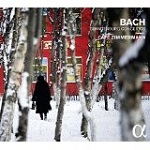 Alpha
300: BACH Brandenburg Concertos - Café Zimmermann (rec.
2000-2010) (2CDs) [37:46 + 50:03] – from 7digital.com
(mp3, £4.49, and lossless, £5.49: no booklet)
Alpha
300: BACH Brandenburg Concertos - Café Zimmermann (rec.
2000-2010) (2CDs) [37:46 + 50:03] – from 7digital.com
(mp3, £4.49, and lossless, £5.49: no booklet)
These recordings have until now been available only individually, spread
across Café Zimmermann’s six CDs of Bach’s orchestral works, alongside
his concertos and the four Orchestral Suites. Fine as those recordings
are and welcomed as they have been by me and other colleagues – e.g.
August
2011/1 – it’s convenient to have them gathered together now. Though
the two CDs are rather short value, it looks as if they will be offered
for the price of one – around £8 the pair.
These small-scale performances will not be to all tastes but they provide
an interesting alternative, revealing details which are sometimes obscured
in other hands.
Alpha 301: BACH Cello Suites - Bruno Cocset (cello) (2CD)
[128:09]
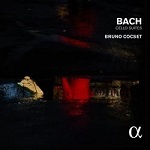
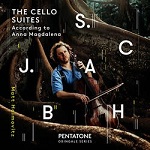 I’m
not the best judge of the Bach Cello Suites, which I find too cerebral
– a charge from which I gladly exonerate almost all of the rest of his
output – so I’ll merely point out that when this recording was first
released one reviewer thought the performances often too mannered and
another that they were quirkily personal. As the 2-CD set sells for
the price of one – around £8 – I can’t recommend the eclassical download
which, at $23.07, takes no cognisance of that.
I’m
not the best judge of the Bach Cello Suites, which I find too cerebral
– a charge from which I gladly exonerate almost all of the rest of his
output – so I’ll merely point out that when this recording was first
released one reviewer thought the performances often too mannered and
another that they were quirkily personal. As the 2-CD set sells for
the price of one – around £8 – I can’t recommend the eclassical download
which, at $23.07, takes no cognisance of that.
Aficionados of the Cello Suites may, however, wish to note yet another
recording, on cello and piccolo cello, from the manuscript in the hand
of Anna Magdalena Bach from Matt Haimovitz on PENTATONE PTC5186555
– sample, stream (for subscribers) or download in 16- or 24-bit lossless,
with pdf booklet, from Qobuz:
at £11.99/£17.99 (16- and 24-bit respectively) that’s less expensive
than from eclassical.com ($24.11/$36.16), certainly for UK purchasers.
Please see also Brief Reviews (below) for another version of the Cello
Suites coupled with the Sonatas for gamba and keyboard.
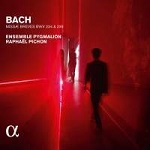
Alpha 302: BACH Missæ Breves BWV234 and 235 - Ensemble
Pygmalion/Raphaël Pichon [62:01]
These very fine performances have come up against some very stiff competition
since they were released in 2008, so their reissue at an attractive
price is very welcome. The 6-CD set and book which includes these performances,
reviewed by Kirk McElhearn, is also worth considering. Eclassical.com
still offer the original album (Alpha 130) in mp3 and lossless, at about
the same price as the reissue on CD but without texts. Qobuz
offer the reissue for £4.79 and with the pdf booklet.
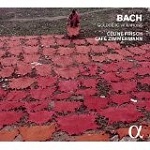
Alpha 303 2 CDs [77:30 + 24:50]
BACH Goldberg Variations - Céline Frisch, Café Zimmermann (rec.
2000 and 2001)
In addition to the Goldberg Variations, BWV988, performed by
Céline Frisch on the harpsichord, a second short bonus disc offers the
much less familiar Goldberg Canons, BWV1087, from Café Zimmermann
and two of the original folksongs which Bach employed, sung by Dominique
Visse (counter-tenor).
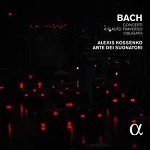 Alpha
304: C.P.E. BACH Concerti a flauto traverse obligato
(flute concertos), Wq22, 167 and 169 - Alexis Kossenko (flute); Arte
dei Suonatori [70:11] – from eclassical.com
(mp3 and lossless, with pdf booklet)
Alpha
304: C.P.E. BACH Concerti a flauto traverse obligato
(flute concertos), Wq22, 167 and 169 - Alexis Kossenko (flute); Arte
dei Suonatori [70:11] – from eclassical.com
(mp3 and lossless, with pdf booklet)
This is the first volume of a programme which was originally released
on two CDs. Eclassical.com have the second volume – ALPHA146.
The music, written for C.P.E’s flute-playing patron, Frederick the Great,
may not be his greatest achievement but the performances make the strongest
possible case for it. As Dominy Clements writes, this is a must-have
for C.P.E. Bach fans - review.
These performances of the Flute Concertos together with the Trios and
Sonatas for flute are also available on a 3-CD set, ALPHA821
– review.
With the CDs on sale for around £19, the eclassical.com download is
somewhat expensive at $38.41 and even the Qobuz
download won’t save you much.
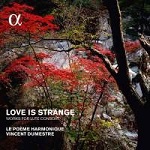
Alpha 305
Love is Strange : Works for Lute Consort - Le
Poème Harmonique/Vincent Dumestre [60:43]
Stylish performances of familiar (Greensleeves, Sellengers
Rounde and Dowland’s Lachrymæ) and unfamiliar music by Anthony
Holborne (?-1602) and contemporaries. The original release (Alpha
081) remains available from eclassical.com,
without booklet, for about the same price as the reissued CD but Qobuz
offer the reissue for £3.83, with booklet.
Alpha 306: MONTEVERDI, MARAZZOLI Combattimenti
! - Le Poème Harmonique/Vincent Dumestre [71:31]
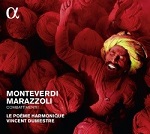 A
competitive performance of several Monteverdi madrigals, including the
dramatic scena Il Combattimento di Tancredi e Clorinda would
not have been enough for an unreserved recommendation in view of the
strong competition: to name but three, from Hyperion (Red Byrd,
etc, CDH55165 and Arcangelo, CDA68019) and Naïve
(Rinaldo Alessandrini – incredibly the wonderful 3-CD set of the whole
of Book VIII seems to have been deleted but should be snapped up from
Qobuz,
where the lossless download costs just £7.99, albeit without booklet).
A
competitive performance of several Monteverdi madrigals, including the
dramatic scena Il Combattimento di Tancredi e Clorinda would
not have been enough for an unreserved recommendation in view of the
strong competition: to name but three, from Hyperion (Red Byrd,
etc, CDH55165 and Arcangelo, CDA68019) and Naïve
(Rinaldo Alessandrini – incredibly the wonderful 3-CD set of the whole
of Book VIII seems to have been deleted but should be snapped up from
Qobuz,
where the lossless download costs just £7.99, albeit without booklet).
The USP of the Alpha reissue is the inclusion of music by Monteverdi’s
younger contemporary: Marazzoli’s La Fiera di Farfa is not just dramatic,
it’s also a comic parody of the Monteverdi. Full details from Dave
Billinge’s review.
I’m surprised that the finished product comes without text: the booklet
which came with my press preview had them – in fact it’s identical with
the link which DBi gives.
Alpha 307:
Nobody’s Jig : 17th-Century Dances from the British
Isles - Les Witches
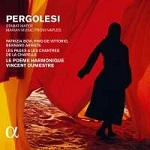
Alpha 308: PERGOLESI Stabat Mater, Marian music
from Naples - Le Poème harmonique/Vincent Dumestre [59:50] – stream
(sample for non-subscribers) or download in lossless sound, with pdf
booklet (£3.83) from Qobuz.
This is an attractive reissue, especially if you like to hear the Pergolesi
in the context of other settings of the Stabat Mater and other
music performed in Naples in Holy Week, but the performance of the
main work yields to several other recordings, some equally inexpensive.
Please see my review
for full details.
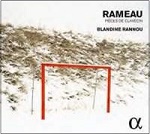 Alpha
309 [63:25 + 74:09]
Alpha
309 [63:25 + 74:09]
RAMEAU Harpsichord Pieces: Pièces de Clavecin (1724),
Nouvelles Suites de Pièces de Clavecin (1728) - Blandine Rannou
(17th-century harpsichord)
The original release on Zig Zag Territoires was a 4-CD set. The chief
loss is in the form of the Pièces de clavecin en concerts, which
I hope may appear separately as the 4-CD set is no longer available
in the UK, though it can be downloaded from Qobuz
for £15.99, who offer the new reissue – here
– for £4.79, pretty good value for a 2-CD set with booklet.
There are alternatives for the Pièces en concerts, three of which
you will find in DL
News 2014/12.
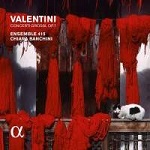
Alpha 310 – Discovery of the Month
VALENTINI Concerti Grossi, Op.7/1-3, 7, 10-11 - Ensemble 415/Chiara
Banchini [74:18]
Like Montanari (below), Valentini was a follower of Corelli and his
Concerti Grossi are recognisably in the style of the master, though
also well worth hearing in their own right in these stylish and powerful
performances, excerpted from a 2-CD set on the Zig-Zag label. The same
selection also appeared on a single Zig-Zag CD and received justifiably
high praise from Jonathan Rohr – review.
At its new price – just £4.79 from Qobuz,
with booklet – it’s irresistible. I hope that Dominy Clements’ plea
for a complete set of Op.7 – review
– doesn’t fall on deaf ears and that Alpha will give us the rest of
that Zig-Zag release soon.
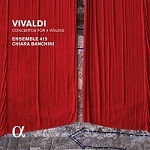
Alpha 311: VIVALDI Concertos for four violins, Op.3/1,
4, 7, 10; RV551 and 553. Ensemble 415/Chiara Banchini [53:59]
Stream (Sample for non-subscribers) or download from Qobuz.
For civilised and stylish performances of these works you need look
no further unless you must have the whole of Op.3, which is by no means
a bad aspiration. Please see my full review.
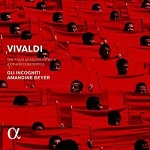
Alpha 312: VIVALDI The Four Seasons, Op.8/1-4;
Concerto in g minor, Op.3/2 (RV578a), Concerto in B-flat, RV372, Concerto
in b minor, RV390 - Gli Incogniti/Amandine Beyer [70:57] – from eclassical.com
(mp3 and lossless, with pdf booklet)
A (very) good performance of the Four Seasons, though it doesn’t
quite challenge any of the top recommendations: among those listed in
MWI
Recommends my own favourites are Fabio Biondi for period performance
(Virgin/Erato) and Alan Loveday and Neville Marriner (Decca) for modern
instruments played with a sense of period style.
Alpha 313: VIVALDI Cello Sonatas, RV39, RV40, RV42-44
and RV47 - Bruno Cocset (cello); Les Basses Réunies
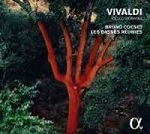 This
1998 recording has been somewhat outshone by a more recent entrant from
the Outhere stable, from Marco Ceccato and Accademia Ottoboni, though
with a slightly different programme (RV39-43 and RV46, Zig-Zag Territoires
ZZT338 –
review – from Qobuz,
16- and 24-bit, with pdf booklet). Ideally you need both in order to
cover the repertoire, which is just a little too much for one CD. If
you bought the Decca Baroque Era set complete or just Volume
2 as a download*, you already have Christophe Coin’s recording of RV44.
This
1998 recording has been somewhat outshone by a more recent entrant from
the Outhere stable, from Marco Ceccato and Accademia Ottoboni, though
with a slightly different programme (RV39-43 and RV46, Zig-Zag Territoires
ZZT338 –
review – from Qobuz,
16- and 24-bit, with pdf booklet). Ideally you need both in order to
cover the repertoire, which is just a little too much for one CD. If
you bought the Decca Baroque Era set complete or just Volume
2 as a download*, you already have Christophe Coin’s recording of RV44.
If you are looking for a budget set of more than half of these sonatas
the Alpha reissue will do nicely. If anything the performances are
a touch more dramatic than Ceccato’s. It’s £4.79 in lossless quality
and with pdf booklet from Qobuz.
For the most complete set available, however, RV39-47, try David Watkin
and members of the King’s Consort on Hyperion Dyad CDD22065, 2
CDs for the price of one – £8.99** from hyperion-records.co.uk,
mp3 and lossless, with pdf booklet:Record of the Month
– review
– DL
Roundup October 2010.
The reissue comes with an interview from March 2015 in which Bruno Cocset
is asked if he would do things differently now. The answer is affirmative
but mainly because he no longer owns the same cello and the membership
of Les Basses Réunies has changed. More enlightening is his defence
of the use of gut strings.
* still excellent value at £11.56 for 25 CDs from Qobuz.
** don’t click the iTunes link and find yourself paying more (£15.99
or $19.99) for lower quality transfers.
***
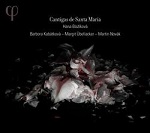
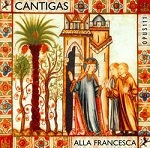 The
Cantigas de Santa Maria are a collection of songs in honour
of the Virgin Mary, compiled at the court of and possibly at least partly
by King Alfonso, known as el Sabio for his wise and tolerant
rule. Though his kingdom was León and Castile, the texts are in the
North-Eastern Spanish dialect, Gallego, closer to Portuguese
than to standard Castilian Spanish. From over 400 cantigas there
are or have been several single-disc selections, eighteen on this new
PHI album, one of the best known of which, Rosa das rosas, is
offered first in instrumental form and later in the sung version. Four
other cantigas are performed instrumentally. The performers
are Hana Blažíková (soprano, Gothic harp, Romanesque harp and musical
direction), Barbora Kabátková (soprano, Gothic harp and psaltery), Margit
Übellacker (dulce melos) and Martin Novák (percussion). (PHI LPH017
[72:32] – from eclassical.com,
mp3, 16- and 24-bit lossless, with pdf booklet containing texts and
translations). I’m not surprised to see that Gary Higginson made this
a Recording
of the Month.
The
Cantigas de Santa Maria are a collection of songs in honour
of the Virgin Mary, compiled at the court of and possibly at least partly
by King Alfonso, known as el Sabio for his wise and tolerant
rule. Though his kingdom was León and Castile, the texts are in the
North-Eastern Spanish dialect, Gallego, closer to Portuguese
than to standard Castilian Spanish. From over 400 cantigas there
are or have been several single-disc selections, eighteen on this new
PHI album, one of the best known of which, Rosa das rosas, is
offered first in instrumental form and later in the sung version. Four
other cantigas are performed instrumentally. The performers
are Hana Blažíková (soprano, Gothic harp, Romanesque harp and musical
direction), Barbora Kabátková (soprano, Gothic harp and psaltery), Margit
Übellacker (dulce melos) and Martin Novák (percussion). (PHI LPH017
[72:32] – from eclassical.com,
mp3, 16- and 24-bit lossless, with pdf booklet containing texts and
translations). I’m not surprised to see that Gary Higginson made this
a Recording
of the Month.
Recordings of the Cantigas don’t always seem to last long in
the catalogue, which is a great pity because the music is beautiful
and doesn’t make as many demands on the modern listener as some other
medieval works. Some time ago I recommended a Nimbus recording performed
by the Martin Best Ensemble (NI5081 – review),
though I thought that the beginner might prefer to start with an inexpensive
and well performed Naxos recording, on which there are fewer sung items
and more instrumental interludes (Ensemble Unicorn, NAXOS 8.553153).
Both are still available. You may wish to look at that review, which
contains some information about the Cantigas which it would be
superfluous to repeat.
I had been listening to the Outhere group press preview of this recording
for some time before the 24-bit lossless version was released by eclassical.com.
Though that press version was only at 256 kb/s, I had already decided
that both performance and recording were enjoyable and recommendable,
but the 24-bit represents a considerable improvement. As the three
albums contain different selections, albeit with some overlap, you really
need them all – and perhaps also the Paniagua recording on Pneuma, if
you can find it: DL
Roundup March 2009.
There’s another, older recording, made by Alla Francesca for Naïve/Opus
111 (OP30308 – from eclassical.com,
mp3 and lossless, NO booklet). These are award-winning performances
but the lack of a booklet constitutes a problem, though the texts of
all the Cantigas are available
online.
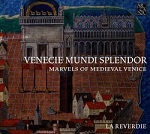 Venecie
Mundi Splendor
Venecie
Mundi Splendor
This recording, subtitled Marvels of Medieval Venice: Music for the
Doges 1330-1430 (Arcana A387 [56:58]), which I recommended
with some small reservations in DL
News 2015/6 is now available from eclassical.com
in mp3, 16- and 24-bit lossless, complete with pdf booklet and, in a
much better transfer than the 192kbs mp3 press preview, the performances
by La Reverdie are even more enjoyable.
Try it from Qobuz
first: subscribers can stream, others can sample, but you should find
the eclassical.com download slightly less expensive at current $/£ exchange
rates.
Download of the Month
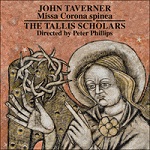 John
TAVERNER (c.1490-1545)
John
TAVERNER (c.1490-1545)
Missa Corona spinea and Dum transisset Sabbatum I and
II performed by The Tallis Scholars/Peter Phillips (GIMELL CDGIM046
[62:07]) is one recording which will assuredly be receiving a more detailed
recording just before it appears on 30 October 2015. It will be available
from Gimell and
Hyperion
in mp3, 16- and 24-bit versions, with pdf booklet, and additionally
on CD from Gimell and dealers.
I’m not letting too many cats out of bags if I say that it’s well up
to the very high standard of earlier Gimell releases and strong competition
for existing recordings by The Sixteen (Hyperion CDH55051 or
inThe Golden Age of Polyphony, CDS44401/10: Bargain of
the Month – review
– review),
St Mary’s, Edinburgh (DELPHIAN DCD34023: Recording of the Month
–
review – review)
and Christ Church, Oxford (ASV CDGAU115).
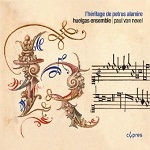 L’Héritage
de Petrus Alamire is a 75-minute selection of music
performed by the Huelgas Ensemble/Paul van Nevel from the collections
made by Peter Alamire, one of which he presented to Henry VIII, for
whom he also doubled as a spy. I would have preferred complete Mass
settings but instead we have the Sanctus and Agnus Dei
from Masses by an anonymous composer (the 6-part Missa N’avez point
veu), Nicolas Champion (Missa de Sancta Maria Magdalena),Johannes
Sticheler (Missa Se j’avoie porpoin de veleur), Robert
de Fevin (Missa Supra la sol fa mi re), Maturin Forestier
(5-part Missa supra baises-moy) and – the only familiar composer
– Josquin Desprez (Missa malheur me bat). It’s available
inexpensively from emusic.com
(mp3, NO booklet) and to stream or download from Qobuz,
who have the booklet but trying to open it caused the page to crash
several times, so I can’t give you more information.
L’Héritage
de Petrus Alamire is a 75-minute selection of music
performed by the Huelgas Ensemble/Paul van Nevel from the collections
made by Peter Alamire, one of which he presented to Henry VIII, for
whom he also doubled as a spy. I would have preferred complete Mass
settings but instead we have the Sanctus and Agnus Dei
from Masses by an anonymous composer (the 6-part Missa N’avez point
veu), Nicolas Champion (Missa de Sancta Maria Magdalena),Johannes
Sticheler (Missa Se j’avoie porpoin de veleur), Robert
de Fevin (Missa Supra la sol fa mi re), Maturin Forestier
(5-part Missa supra baises-moy) and – the only familiar composer
– Josquin Desprez (Missa malheur me bat). It’s available
inexpensively from emusic.com
(mp3, NO booklet) and to stream or download from Qobuz,
who have the booklet but trying to open it caused the page to crash
several times, so I can’t give you more information.
The other works are not otherwise available, so it’s superfluous to
point to my preference for the superb performance by The Tallis Scholars
of the complete Josquin Mass (with Missa fortuna desperata, GIMELL
CDGIM042 –
review – review
– or more economically on Sacred Music in the Renaissance 3,
GIMBX303, 4 CDs for around £16: Bargain of the Month
– review
– DL
Roundup December 2010). That’s comparing the very good with the
best; otherwise the Huelgas Ensemble give some very satisfying performances
here and the mp3 sound from emusic.com is more than adequate, now that
they have changed to 320kbs all round.
Heinrich BIBER (1644-1704)
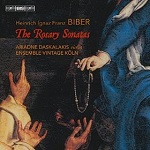
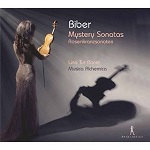
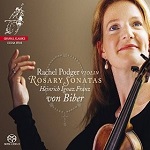 Three
new recordings have followed hard on each other’s heels.1
A recent BIS release contains what I was inclined to regard as my benchmark
recording of Biber’s Rosenkranz, Rosary or Mystery Sonatas (BIS-SACD-2096).
I reviewed this recording by Ariadne Daskalakis (violin) and Ensemble
Vintage Köln from the 2-SACD set but the 24-bit download from eclassical.com
should be comparable to the SACD stereo layer – full
review.
Three
new recordings have followed hard on each other’s heels.1
A recent BIS release contains what I was inclined to regard as my benchmark
recording of Biber’s Rosenkranz, Rosary or Mystery Sonatas (BIS-SACD-2096).
I reviewed this recording by Ariadne Daskalakis (violin) and Ensemble
Vintage Köln from the 2-SACD set but the 24-bit download from eclassical.com
should be comparable to the SACD stereo layer – full
review.
Two other versions have also appeared and, as it happens, their virtues
are complementary to the BIS recording. Rachel Podger has already given
us a very fine account of the solo sonata which concludes the Rosary
Sonatas: the so-called Guardian Angel gave its name to her recent
collection of music by Bach and others on CHANNEL CLASSICS CCSSA35513.
Now that recording has been added to her performance of the other sonatas,
with a distinguished group of other musicians (CCSSA37315).
I downloaded the 16-bit version of the performance from Qobuz
while it was on pre-release offer at an attractive price and I’ve placed
a bid for the SACD in the next batch of discs for review, so I may have
more to say on the main MusicWeb pages. For the moment I’ll simply
say that Podger and her team exemplify a superbly played version for
those who prefer a cooler, more thoughtful approach.
Those who like to stress the sheer outlandish power of this music, with
the violin retuned in various unorthodox scordatura settings
for each sonata, will probably prefer Lina Tur Bonet and Musica Alchemica
on PAN CLASSICS PC10329 [125:20] – from eclassical.com
(mp3, 16- and 24-bit lossless, with booklet)
I originally planned to include some other recommendations of Biber’s
music in the review of the BIS, but decided that it would be less confusing
to reserve them for this Download News. Some I have mentioned before
and I give links where appropriate, but others I haven’t referred to
before.
Chandos offer several fine recordings of Biber’s music:
Mensa Sonora is a collection of much lighter music than the Rosenkranz
Sonatas but equally well crafted. With the Sonata in A for violin,
violone and harpsichord it’s very well performed by the Purcell Quartet
and Jane Rogers (viola) on CHANDOS CHAN0748 [58:55] – from theclassicalshop.net,
mp3, 16- and 24-bit lossless, with pdf booklet.
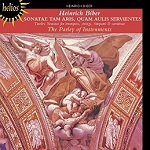
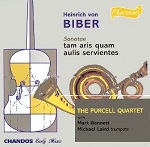
The cumbersome-looking Latin title Sonatæ tam aris, quam aulis servientes
simply indicates music suitable for sacred and secular use. There are
five current recordings of the complete set of twelve sonatas, among
which the budget set on Hyperion Helios stands out for price and quality.
(CDH55041 [58:34] – from hyperion-records.co.uk,
mp3 and lossless, with pdf booklet). Otherwise there’s little to choose
between that recording and its rival from the Purcell Quartet on Chandos
CHAN0591 [65:34] – from theclassicalshop.net,
mp3 and lossless, with pdf booklet.
1 Yet another version, which I missed earlier this year,
is listed in Brief Reviews below.
Antonio Maria MONTANARI (1676 – 1737)
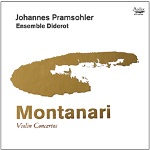
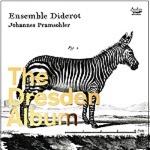
Here’s a new name for lovers of Corelli to add to their list. Montanari's
Violin Concertos are redolent of his great predecessor but very
enjoyable, all but one of the six in premiere recordings, from period
performers Ensemble Diderot/Johannes Pramsohler (violin). My full review
may have appeared on MusicWeb by the time that you read this; if not,
the short message is that I urge you to give it a try. (AUDAX ADX13704
[59:47] – from eclassical.com,
mp3, 16- and 24-bit lossless, with pdf booklet).
One of these concertos was composed for Pisendel in Dresden. The same
performers also offer a most enjoyable – perhaps even more enjoyable
– collection of trio sonatas composed for the same city by HANDEL,
TUMA, FASCH and FUX (The Dresden Album: AUDAX ADX13701
[62:59] – from eclassical.com,
mp3, 16- and 24-bit lossless, with pdf booklet). The zebra on the cover
strikes the only rather odd note.
Antonio VIVALDI (1678-1741)
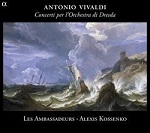
Vivaldi also composed concertos for Pisendel to perform in Dresden.
There are four CDs of these on Naxos as well as a Naïve/Opus 111 recording.
There’s also an Alpha recording which Johan van Veen made a Recording
of the Month: Concerti per l’Orchestra di Dresda, containing
RV562, 568, with an alternative movement, 569, 571 and 574, performed
in 2012 by Les Ambassadeurs/Alexis Kossenko (ALPHA109 [65:59]
– from eclassical.com,
mp3, 16- and 24-bit lossless, with pdf booklet). It’s subtitled Volume
1 but to my knowledge there has not, unfortunately, been a successor.
There’s also a collection of Dresden Sonatas performed
by Fabio Biondi and Rinaldo Alessandrini (NAIVE OP30154 [55:47]
– from eclassical.com,
mp3 and lossless). I reviewed that in DL
News 2013/13 along with another, less recommendable, Estonian recording.
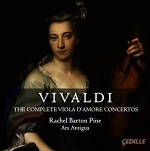
A new recording of Vivaldi’s complete concertos for viola d’amore, RV97
and RV392-7 performed by Rachel Burton Pine (viola d’amore) and Arts
Antigua (CEDILLE CDR90000159 [78:21] – from eclassical.com,
mp3, 16- and 24-bit lossless, NO booklet) competes with an older recording
from Catherine Mackintosh and the Orchestra of the Age of Enlightenment
(HYPERION HELIOS CDH55178 – from hyperion-records.co.uk,
mp3 and lossless, with pdf booklet). There’s little to choose between
them except that the booklet comes with the Hyperion.
To the six concertos on Hyperion the new recording adds the Concerto
for viola d’amore and lute, with Hopkinson Smith the extra soloist.
That extra work, RV540, appears on another Hyperion recording of Vivaldi’s
music for lute and mandolin (CDA30027 – from
hyperion-records.co.uk, mp3 and lossless, with pdf booklet – October
2010) and on a similar mid-price Warner Teldec album from Il Giardino
Armonico (2564698542).
Johann Sebastian BACH (1685-1750)
Having completed their series of recordings of the sacred cantatas,
to well-nigh universal acclaim – the only disappointment is that there
are no more to come – Masaaki Suzuki and his Bach Collegium Japan are
now onto their fifth volume of the secular cantatas, with two Birthday
Cantatas for the Prince-Elector and the Queen respectively. Nos. 213
– Lasst uns sorgen, last uns wachen1– and 214 – Tönet,
ihr Pauken – may be less frequently performed than the immensely
enjoyable Nos. 211, the ‘Peasant’ Cantata and 212, the ‘Coffee’ Cantata,
but they are both attractive. (BIS-2161 - from eclassical.com,
mp3, 16- and 24-bit lossless, with pdf booklet). Even the large swathes
of Bach cribbing from himself are appropriate to the new context – like
Handel, Bach was never one to let a good tune go to waste. It’s even
fun to spot the borrowings; in some cases it’s the other way around,
with music later re-used in the Christmas Cantata.
With an excellent line-up of soloists2 and first-rate recording,
this is yet another credit for Suzuki and his team.
1 Also known as Herkules am Scheideweg (Hercules
at the Crossroads)
2 Joanne Lunn (soprano), Robin Blaze (alto), Makoto Sakurada
(tenor) and Dominik Wörner (bass)
Jan Dismas ZELENKA (1679-1745)
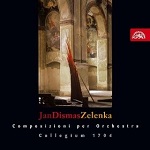 The
Bohemian composer Zelenka, who worked at the Dresden court, almost has
the distinction of being the last musician in alphabetical order but
his music is valuable for much more than that. A good place to start
exploring would be a recording of his instrumental music by the Czech
group Collegium 1704 on Supraphon, containing Overture à 7 concertanti
in F, Sonata No. 3 in B flat, Concerto à 8 concertanti in G,
ZWV186, Hipocondrie à 7 concertanti in A, ZWV187, Sinfonia à
8 concertanti in a minor ZWV189. The most remarkable music here is
Hipocondrie (hypochondria) – no-one knows why the bizarre name.
(SU38582 [67:39] – £6.30 from emusic.com).
The variable bit-rate is not ideal but, at an average of around 226kbs,
it’s not greatly inferior to what you might expect from Amazon
UK where it’s available for £7.99 if you don’t subscribe to emusic.
The
Bohemian composer Zelenka, who worked at the Dresden court, almost has
the distinction of being the last musician in alphabetical order but
his music is valuable for much more than that. A good place to start
exploring would be a recording of his instrumental music by the Czech
group Collegium 1704 on Supraphon, containing Overture à 7 concertanti
in F, Sonata No. 3 in B flat, Concerto à 8 concertanti in G,
ZWV186, Hipocondrie à 7 concertanti in A, ZWV187, Sinfonia à
8 concertanti in a minor ZWV189. The most remarkable music here is
Hipocondrie (hypochondria) – no-one knows why the bizarre name.
(SU38582 [67:39] – £6.30 from emusic.com).
The variable bit-rate is not ideal but, at an average of around 226kbs,
it’s not greatly inferior to what you might expect from Amazon
UK where it’s available for £7.99 if you don’t subscribe to emusic.
An alternative recording also featuring Hipocondrie, from Concentus
Musicus Vienna conducted by Nikolaus Harnoncourt, is perhaps better
played but short value even at budget price on Warner Teldec Das Alte
Werk 2564697648 – nothing appears to have been added to the older
CD which I own, running to just 47:05.
Short playing time is also my only reservation in the case of a Linn
recording of Zelenka’s instrumental music from Ensemble Marsyas (CKD415)
which I
reviewed both from SACD and as a 24-bit download – see also review
by Dominy Clements.
Hyperion have two very worthwhile recordings of Zelenka’s sacred music:
- Lamentations, ZWV53(CDH55106) – see March
2010 Roundup
- Litaniæ de venerabili altaris sacramento, Z147, etc.
(CDH55424) – see January
2012/1 Roundup
and there’s the Offficium defunctorum and Requiem on Accent
(ACC24244) – also
January 2012/1 Roundup.
The Magnificat in D, ZWV108, the Christmas Mass, Missa Nativitatis
Domini, ZWV8, and Dixit Dominus, ZWV68, have been recorded
onGenuin GEN11213 and the Magnificats in C and D also
feature alongside the Bach Magnificat in a recording by Masaaki
Suzuki on BIS BIS-CD-1011 – see DL
News 2013/16.
Zelenka’s Te Deum is coupled with a Mass by his contemporary
Heinichen on CARUS 83.148 – see DL
News 2013/10. The eclassical.com download is still devoid of the
booklet but otherwise highly recommendable. Qobuz don’t have the booklet
for that, either, or for Zelenka’s Missa Dei Patris (CARUS
83.209) – here
– but they do offer his Missa Votiva (also CARUS 83.223)
– here
– for sampling, streaming and download with booklet.
Jean Philippe RAMEAU (1683-1764)
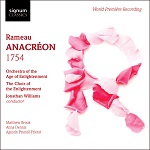 Much
as I have enjoyed recordings of the suite from Anacréon (1754),
the release of what is claimed as a world premiere recording of the
complete opéra-ballet from the Choir and Orchestra of the Age
of Enlightenment/Jonathan Williams is very welcome (SIGNUM SIGCD402
[50:16] – from hyperion-records.co.uk,
mp3, 16- and 24-bit lossless, with pdf booklet). The download offers
a real bargain, with prices from £5.99 (mp3 and 16-bit) to £9.00 (24-bit).
The soloists are Anna Dennis (soprano), Agustin Prunell-Friend (tenor)
and Matthew Brook (bass).
Much
as I have enjoyed recordings of the suite from Anacréon (1754),
the release of what is claimed as a world premiere recording of the
complete opéra-ballet from the Choir and Orchestra of the Age
of Enlightenment/Jonathan Williams is very welcome (SIGNUM SIGCD402
[50:16] – from hyperion-records.co.uk,
mp3, 16- and 24-bit lossless, with pdf booklet). The download offers
a real bargain, with prices from £5.99 (mp3 and 16-bit) to £9.00 (24-bit).
The soloists are Anna Dennis (soprano), Agustin Prunell-Friend (tenor)
and Matthew Brook (bass).
I have just received the CD for review, so look out for a fuller review
on the main pages.
I’m not sure about the world premiere claim: there was an earlier recording
by Les Musiciens du Louvre/Mark Minkowski (DG ARCHIV 4492112
– download only).
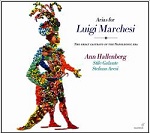 There
are two releases of baroque arias. The first follows the pattern established
by several labels recently of concentrating on music associated with
a particular singer, on this occasion Luigi Marchesi, billed
as ‘the great castrato of the Napoleonic era’. Music by Giuseppe
SARTI, Niccolò Antonio ZINGHARELLI, Johann Simon MAYR, Luigi CHERUBINI,
Gaetano PUGNANI, Francesco BIANCHI, Domenico CIMAROSA and Josef
MYSLIVECEK is sung by Ann Hallenberg (mezzo), assisted on two tracks
by Francesca Cassinari (soprano), with Stile Galante/Stefano Aresi (
GLOSSA GCD923505 rec. 2015 [70:55] – from eclassical.com,
mp3, 16- and 24-bit lossless, with pdf booklet, containing texts and
translations).
There
are two releases of baroque arias. The first follows the pattern established
by several labels recently of concentrating on music associated with
a particular singer, on this occasion Luigi Marchesi, billed
as ‘the great castrato of the Napoleonic era’. Music by Giuseppe
SARTI, Niccolò Antonio ZINGHARELLI, Johann Simon MAYR, Luigi CHERUBINI,
Gaetano PUGNANI, Francesco BIANCHI, Domenico CIMAROSA and Josef
MYSLIVECEK is sung by Ann Hallenberg (mezzo), assisted on two tracks
by Francesca Cassinari (soprano), with Stile Galante/Stefano Aresi (
GLOSSA GCD923505 rec. 2015 [70:55] – from eclassical.com,
mp3, 16- and 24-bit lossless, with pdf booklet, containing texts and
translations).
The picture on the cover is grotesquely pixelated but there’s nothing
amiss with the performances: Ann Hallenberg stands out from a fine line-up
of soloists on the Virgin recording of Handel’s Giove in Argo and
she’s on equally fine form here. The recording comes in 24/48 form
rather than 24/96 but sounds none the worse for that. My only reservation
is that, as with all such recitals, 70 minutes of mezzo singing, with
only a little soprano intervention, is perhaps too much at one sitting.
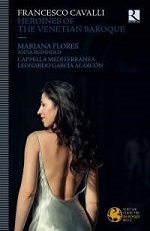 The
other is a 2-CD set of music by Francesco CAVALLI (1602-1676),
entitled Heroines of the Venetian Baroque. Maria Flores (soprano),
assisted in part by Anna Reinhold (mezzo), Marine Chaboud (soprano)
and Igor Tchernov (countertenor), performs with support from Cappella
Mediterranea and Clematis and their director Leonardo García Alarcón
(harpsichord and organ). (RICERCAR RIC359 rec. 2014 [109:56]
– from eclassical.com,
mp3, 16- and 24-bit lossless, with pdf booklet containing texts and
translations). Several of the arias and two of the instrumental sinfonias
included are not otherwise available.
The
other is a 2-CD set of music by Francesco CAVALLI (1602-1676),
entitled Heroines of the Venetian Baroque. Maria Flores (soprano),
assisted in part by Anna Reinhold (mezzo), Marine Chaboud (soprano)
and Igor Tchernov (countertenor), performs with support from Cappella
Mediterranea and Clematis and their director Leonardo García Alarcón
(harpsichord and organ). (RICERCAR RIC359 rec. 2014 [109:56]
– from eclassical.com,
mp3, 16- and 24-bit lossless, with pdf booklet containing texts and
translations). Several of the arias and two of the instrumental sinfonias
included are not otherwise available.
Maria Flores, Cappella Mediterranea, Clematis and Leonardo García Alarcón
appeared on an earlier Ricercar release: Cipriano de Rore Anchor
che col partire and other music, which I found very enjoyable (RIC355
– review).
I seem to have missed another recording featuring Cappella Mediterranea
and Leonardo García Alarcón accompanying Anne Sofie von Otter, which
Göran Forsling thought indispensable (Sogno Barocco, NAIVE
V5286 – review).
1
The CDs come in a hardback book, the contents of which are provided
with the download.
1 I downloaded that recording some time ago, meaning to
review it, but didn’t do so because it contained three rogue tracks.
It can be streamed from Naxos
Music Library and sampled, streamed by subscribers, or downloaded
in 16- or 24-bit lossless from Qobuz
(both with 95-page pdf booklet containing texts and translations).
Both have all the correct tracks: now that I’ve been able to hear the
whole album, it’s every bit as good as Göran Forsling’s review
says.
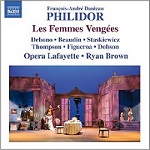
François-André Danican PHILIDOR (1726-1795)
I wouldn’t describe Philidor’s one-act opera Les Femmes Vengées
as an essential purchase but I enjoyed the recent Naxos recording by
Opera Lafayette and Ryan Brown a great deal more than I had expected
–
full review. Download from classicsonlinehd.com
in mp3 and lossless, with pdf booklet.
Philidor’s Le Mariage de la Grosse Cathos, directed by Paul Goodwin,
is coupled with Lully’s Le Bourgeois Gentilhomme on Harmonia
Mundi HMU907122 – [58:18] from eclassical.com
(mp3 and lossless, NO booklet).
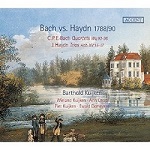
Bach vs. Haydn 1788/90 consists of two CDs, one
of Franz Joseph HAYDN (1732-1809) Trios for piano flute and violoncello
and one of C.P.E. BACH (1714-1788) Quartets for harpsichord,
flute and viola, all works written around the same time. Johan van
Veen’s review
caught my eye when I was converting it for publication, encouraging
me to try the download. As he writes, ‘The overall quality of these
performances and the combination of two series of pieces which are so
characteristic of their respective composers make this set a winner.
Even if you have good recordings of these works in your collection there
is every reason to add this set.’
The performers are Ewald Demeyere (harpsichord), Barthold Kuijken (transverse
flute), Ann Cnop (viola) in the Bach and Piet Kuijken (fortepiano),
Barthold Kuijken (transverse flute), Wieland Kuijken (cello) in the
Haydn. (ACCENT ACC24293 [63:03 + 44:24] – from eclassical.com,
mp3 and lossless, with pdf booklet).
Joseph HAYDN (1732-1809)
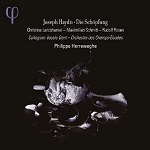 I
fell in love with Die Schöpfung, Hob. XXI:2, when it was performed
by semi-professionals and the school choir where I did my teaching practice
way back in 1964 and it’s been one of my favourite works ever since.
Parts I and II in particular are chock-full of wonderful tunes – splendid
music to sing in the chorus.
I
fell in love with Die Schöpfung, Hob. XXI:2, when it was performed
by semi-professionals and the school choir where I did my teaching practice
way back in 1964 and it’s been one of my favourite works ever since.
Parts I and II in particular are chock-full of wonderful tunes – splendid
music to sing in the chorus.
After hearing it I bought the Philips reissue of the Vanguard recording
conducted by Mogens Wöldike1 – not bad but outshone by the
very fine new recording on which it’s performed by Christina Landshamer
(soprano) – Gabriel/Eva; Maximilian Schmitt (tenor) – Uriel; Rudolf
Rosen (bass) – Raphael/Adam; Collegium Vocale Gent and Orchestre des
Champs-Élysées/Philippe Herreweghe (PHI LPH018) – stream or download
from Qobuz.
Of the 80+ versions currently available, this has to be one of the best.
I enjoyed it so much that I didn’t do any comparisons, though I hope
to include Harry Christophers’ new recording in English with the Handel
and Haydn Society of Boston (CORO
COR16135) in the next edition, perhaps in comparison also with
Colin Davis’ LSO account (LSO0628 – from Qobuz,
but 16-bit only and not representing a great saving on the SACD) and
Bernard Haitink (BR KLASSIK 900125: Recording of The Month
– review
– review
– review:
from eclassical.com
(mp3 and lossless, with pdf booklet).
Texts and translations are included with this new release, which employs
the same forces as Herreweghe’s The Seasons (LPH013),
thereby fulfilling the hope expressed by John Quinn in his review
of that release.
1 Wöldike had an affinity with Haydn: I’d say it was well
worth exploring the 5-CD box in decent transfers from Eone of his still
stylish accounts of thirteen symphonies, from different periods of Haydn’s
work, with the VSOO – stream (sample for non-subscribers) or download
for just £7.99 from Qobuz
– except that the streamed version of the first track, No.60/i has a
couple of serious dropouts which, I presume, are also present on the
download.
Wolfgang Amadeus MOZART (1756-1791)
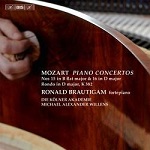
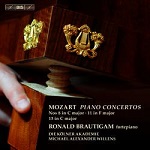 The
BIS series of performances on the fortepiano and period instruments
from Ronald Brautigam, die Kölner Akademie and Michael Willens continues
with Nos. 8 (K246), 11 (K413) and 13 (K415) (BIS-2074 [68:28]
– from eclassical.com,
mp3, 16- and 24-bit lossless, with pdf booklet). It follows fairly
hard upon the heels of BIS-2064, containing Nos. 15 (K450) and
16 (K451) plus the Rondo K382 [53:43] – from
eclassical.com, mp3, 16- and 24-bit lossless, with pdf booklet),
enthusiastically
reviewed by Dave Billinge.
The
BIS series of performances on the fortepiano and period instruments
from Ronald Brautigam, die Kölner Akademie and Michael Willens continues
with Nos. 8 (K246), 11 (K413) and 13 (K415) (BIS-2074 [68:28]
– from eclassical.com,
mp3, 16- and 24-bit lossless, with pdf booklet). It follows fairly
hard upon the heels of BIS-2064, containing Nos. 15 (K450) and
16 (K451) plus the Rondo K382 [53:43] – from
eclassical.com, mp3, 16- and 24-bit lossless, with pdf booklet),
enthusiastically
reviewed by Dave Billinge.
Both of these continue to maintain the very high standard of the earlier
volumes, even for those who are not great fans of the fortepiano. For
out-and-out haters of the instrument, Susan Tomes with the Gaudier Ensemble
in the chamber versions of Nos. 11-13 may be more the ticket, even though
that, like the whole Hyperion Helios series, has reverted to full price.
(CDH55333 – from hyperion-records.co.uk,
mp3, 16- and 20-bit lossless, with pdf booklet. You may find the odd
CD still on sale for around £6.50).
Carl CZERNY (1791-1857)
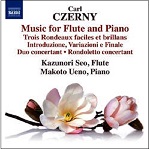
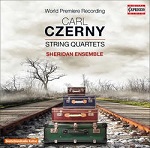 Like
generations of would-be pianists – I stress the conditional – I had
to plough through Czerny’s Etudes and came to hate him and them,
so I had to persuade myself that his music was worth listening to.
I still can’t bring myself to listen to his music for solo piano, despite
recommendations from my colleagues for the Nimbus series of recordings
from Martin Jones – review
– review
– review
– review.
Like
generations of would-be pianists – I stress the conditional – I had
to plough through Czerny’s Etudes and came to hate him and them,
so I had to persuade myself that his music was worth listening to.
I still can’t bring myself to listen to his music for solo piano, despite
recommendations from my colleagues for the Nimbus series of recordings
from Martin Jones – review
– review
– review
– review.
Music for Flute and Piano is performed by Kazunori Seo (flute)
and Makoto Ueno (piano) on NAXOS 8.573335 [78:20] – from classicsonlinehd.com
or Qobuz,
both in lossless and with pdf booklet. The charming, rather inconsequential
music receives suitably intimate performances and recording.
Rather more substantial fare is offered in the form of ‘world premiere’
recordings of his String Quartets in a minor, d minor, D and
e minor from the Sheridan Ensemble on a 2-CD set (CAPRICCIO C5234
[113:32]– from eclassical.com,
mp3 and lossless, with pdf booklet). Actually, I understand that despite
the prominent claim on the cover, two of these works have been recorded
before, though only the d minor is otherwise currently available, appropriately
coupled with Haydn, Pleyel and Werner by the Haydn Quartet (GRAMOLA
GRAM99047).
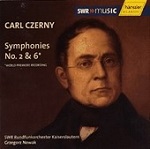
I haven’t heard that other recording but the sympathetic and lyrical
Capriccio performances, with recording to match, have reconciled me
to at least one aspect of Czerny’s music. Though written as late as
the 1850s, it’s middle-period rather than late-period Beethoven that
is evoked.
More substantial still are the two Symphonies: No.6 in g minor
(1854, world premiere recording), and No.2 in D, Op.781, recorded
by the Kaiserslautern Symphony Orchestra (SWR) and Grzegorz Nowák (HAENSSLER
CD93.169 [73:41] – from
eclassical.com, mp3 and lossless, or stream from Qobuz,
NO booklet from either).
These may not be very original works and they must have sounded somewhat
dated in the 1850s, but they are well crafted and very attractive in
these idiomatic and well recorded performances.
Bargain of the Month
Niels Wilhelm GADE (1817-1890)
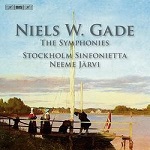
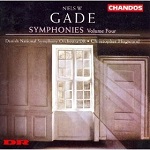 Somewhat
illogically, not all the BIS box sets offered on CD at special prices
are available similarly reduced on their own eclassical.com website,
which means that they are sometimes less expensive to download elsewhere
or to buy on physical CD or SACD.
Somewhat
illogically, not all the BIS box sets offered on CD at special prices
are available similarly reduced on their own eclassical.com website,
which means that they are sometimes less expensive to download elsewhere
or to buy on physical CD or SACD.
The eight symphonies of nineteenth-century composer Niels Gade plus
his Violin Concerto and Korsfarene (The Crusaders) are, however,
a notable exception: five CDs from eclassical.com
in mp3 and lossless, with pdf booklet, at $20.50. The performers are
the Stockholm Sinfonietta directed by Neeme Järvi, with Anton Kontra
(violin), Malmö Symphony Orchestra/Paavo Järvi in the concerto and Kurt
Westi (tenor), Marianne Rørholm (mezzo), Ulrik Cold (bass), Canzone-koret,
Da Camera, Kor 72, Musikstuderendes Kammerkor and Aarhus Symphony Orchestra/Frans
Rasmussen in Korsfarene (BIS-1835/36 [5:00:32], effectively
5 for the price of 2).
Mendelssohn was a great admirer, which is hardly surprising in view
of the influence which his music clearly had on Gade. Forget the similarities
and enjoy some very good performance of some very pleasant music, though
I don’t recommend hearing all eight symphonies in one go.
There are alternative recordings from Chandos – I reviewed Symphonies
Nos. 3 and 6, with Efterklange af Ossian, CHAN9795 in
DL
Roundup June 2010. Those equally recommendable recordings offer
alternative accounts from the Danish National Orchestra conducted by
Christopher Hogwood. Though not available as a set, they compensate
by containing extra works as fillers:
- Symphonies 2 and 8 include a discarded movement from No.8
and In the Highlands (CHAN9862 [69:05] – from theclassicalshop.net,
mp3, 16- and 24-bit lossless, with pdf booklet).
- Symphonies 4 and 7 are coupled with Concert Overture No.3
(CHAN9957 – from theclassicalshop.net,
mp3 and lossless with pdf booklet)
- Symphonies 1 and 5 complete the set (CHAN10026 – from
theclassicalshop.net,
mp3 and lossless with pdf booklet)
Anton BRUCKNER (1824-1896)
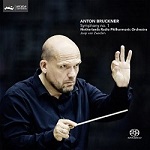 Bruckner
had already composed two unpublished symphonies – now labelled ‘00’
and ‘0’ – before his official First Symphony, a new recording of which
has recently appeared from the Netherlands Radio Philharmonic Orchestra
and Jaap van Zweden (CHALLENGE CLASSICS CC72556 [51:23]). Supposedly
the symphony is presented in its original 1865/6 garb, though Ralph
Moore in his review
has evidence that it’s really the 1877 edition with further changes.
The download from emusic.com is the least expensive – mp3 only but,
like all their recent releases, at the full 320kbs, albeit without booklet.
In fact, I have not been able to find a download that comes with the
booklet.
Bruckner
had already composed two unpublished symphonies – now labelled ‘00’
and ‘0’ – before his official First Symphony, a new recording of which
has recently appeared from the Netherlands Radio Philharmonic Orchestra
and Jaap van Zweden (CHALLENGE CLASSICS CC72556 [51:23]). Supposedly
the symphony is presented in its original 1865/6 garb, though Ralph
Moore in his review
has evidence that it’s really the 1877 edition with further changes.
The download from emusic.com is the least expensive – mp3 only but,
like all their recent releases, at the full 320kbs, albeit without booklet.
In fact, I have not been able to find a download that comes with the
booklet.
Granted that, though I like Eugen Jochum’s Bruckner, many object to
his tempo changes, one of my benchmarks for the Bruckner symphonies
comes in the form of Stanislaw Skrowaczewski’s Oehms recording of the
1877 Linz/Nowak edition of No.1 with the Saarbrücken Radio Symphony
Orchestra (OC210 [45:50]) – from eclassical.com
and for streaming from classicsonlinehd.com
in mp3 and lossless. NO booklet from either). If I prefer Skrowaczewski’s
tempi for the first two movements, where he’s much faster than van Zweden,
I nevertheless enjoyed hearing the new recording, though neither can
disguise the fact that, though it has its moments, especially in the
finale, this is not the place for beginners to start their Bruckner
adventure – that would be No.4, the Romantic, from Karl Böhm
(DECCA Originals 4758403 or Double DECCA 4480982, with
Symphony No.3, download only) or Gunther Wand (RCA 09026688392).
Another fine series of Bruckner recordings, from Georg Tintner, does
include the 1866 original version and at budget price on Naxos – stream
or download from classicsonlinehd.com,
with pdf booklet. That recording offers a substantial bonus in the
form of the 1876 version of the Adagio of Symphony No.3. (8.554430
[75:41] –
review – review).
There’s a recording of Symphonies Nos. 1-3 which Daniel Barenboim made
with the Berlin Staatskapelle for his own Peral label, but it’s available
only in low-bit-rate sound from iTunes and Amazon – DL
News 2014/7.
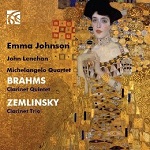
Johannes BRAHMS (1833-1897)
There are plenty of very good recordings of the Clarinet Quintet
in b minor, Op.115, but only five of his pupil Alexander ZEMLINSKY’s
Clarinet Trio in d minor, Op.3, so a recent recording of both featuring
Emma Johnson (clarinet) with the Michelangelo Quartet and John Lenehan
(piano) is particularly welcome. (NIMBUS ALLIANCE NI6310 – from
emusic.com,
mp3, NO booklet but you do get a Klimt cover).
Frederick DELIUS (1862-1934)
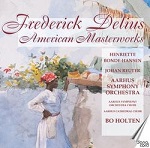 I
missed Danacord’s series of Delius recordings with Bo Holten directing
the Aarhus Symphony Orchestra when they were released and I’ve only
just caught up with the American Masterworks volume (DACOCD732
[78:26]), courtesy of eclassical.com,
where it’s available in mp3 16- and 24-bit lossless, with pdf booklet.
The Koanga excerpts include La Calinda, originally part
of the Florida Suite, as recorded by Thomas Beecham (The English
Collection, EMI/Warner 9099152 – review
– review).
Appalachia was another Beecham speciality but the Danacord recording,
especially in 24-bit, is greatly preferable to Beecham’s old mono, available
from Past Classics – DL
Roundup May 2012/2 – and, as Ian Lace says in his
Recording of the Month review, where you will find
all the details, this is a very moving account.
I
missed Danacord’s series of Delius recordings with Bo Holten directing
the Aarhus Symphony Orchestra when they were released and I’ve only
just caught up with the American Masterworks volume (DACOCD732
[78:26]), courtesy of eclassical.com,
where it’s available in mp3 16- and 24-bit lossless, with pdf booklet.
The Koanga excerpts include La Calinda, originally part
of the Florida Suite, as recorded by Thomas Beecham (The English
Collection, EMI/Warner 9099152 – review
– review).
Appalachia was another Beecham speciality but the Danacord recording,
especially in 24-bit, is greatly preferable to Beecham’s old mono, available
from Past Classics – DL
Roundup May 2012/2 – and, as Ian Lace says in his
Recording of the Month review, where you will find
all the details, this is a very moving account.
Sea Drift is not one of my many Delius favourites, so I’ll simply
refer you to IL’s minor reservations. I’m hard put to choose between
Bo Holten and Andrew Davis in Appalachia – Download of
the Month, April
2011/1 – so the choice can safely be left to the coupling, in Davis’s
case The Song of the High Hills. The Mackerras recording in
the Decca British Music Collection, which I also like, is now download
only – £7.49 in mp3 or £11.99 in lossless from
7digital.com – or as a 2-CD set from presto-classical.co.uk.
It isn’t included on his otherwise worthwhile Delius collection, still
available on a Double Decca budget twofer.
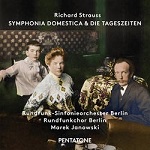
Richard STRAUSS (1864-1949)
There are several fine recordings of Symphonia Domestica,
Op.53, but only three others of Die Tageszeiten, Op.76,
one of which is download only on the American Symphony Orchestra’s own
label, while another appears only on a Warner 3-CD set of The Other
Richard Strauss.
Marek Janowski’s coupling of these two strange bedfellows with the Rundfunk-Sinfonieorchester
Berlin and the male voices of their choir has already been welcomed
by Michael Cookson – review
– and John Whitmore – review.
(PENTATONE PTC5186507 – from eclassical.com,
mp3, 16- and 24-bit lossless, with pdf booklet, containing texts and
translations).
Alexander GLAZUNOV (1865-1936)
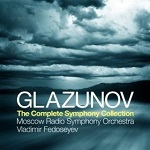
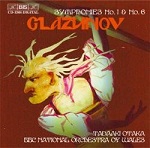 If
you were swept away by Glazunov’s The Seasons on the Beulah recording
which I made Reissue of the Month in
2015/8 (7PD11 - from Amazon
UK or iTunes),
you may be thinking about investigating his symphonies.
If
you were swept away by Glazunov’s The Seasons on the Beulah recording
which I made Reissue of the Month in
2015/8 (7PD11 - from Amazon
UK or iTunes),
you may be thinking about investigating his symphonies.
The complete set of Glazunov Symphonies from the Moscow RTV Symphony
Orchestra/Vladimir Fedoseyev from Amazon
UK for £4.99* is certainly a bargain. These are idiomatic performances
and the recording is good enough to appreciate them, but certainly not
of the best, even in the Denon transfer from Qobuz.
Given that the Amazon set is likely to be at only 256kb/s, I recommend
listening to the samples available for each track before buying.
You will need to spend a little more for equally fine performances in
better recordings: the BIS series of five CDs from Tadaaki Otaka and
the BBC National Orchestra of Wales is available as a set on disc for
around £28, five for the price of two, so $50.46 from BIS’s own eclassical.com
is hardly competitive, though individual discs from there are well worth
considering:
BIS-1638 (Nos. 1 and 6); BIS-1308
(No.2, etc.); BIS-1358
(No.3; Ballade); BIS-1378
(Nos. 4 and 8) and BIS-1388
(Nos. 5 and 7).
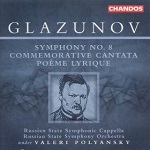
The individual albums from the Russian State SO and Valeri Polyansky
(Chandos) are also well worth considering for download from theclassicalshop.net:
CHAN9751
(No. 1 and Violin Concerto);
CHAN9709 (No.2 and Coronation Cantata);
CHAN9658 (No.3 and Concert Waltzes);
CHAN9739 (Nos. 4 and 5);CHAN10238
(No.6 and Characteristic Suite) and CHAN9961
(No.8 and Commemorative Cantata).
If you want to mix and match, I suggest the BIS recording of Nos. 1
and 6 and the Chandos of No.8. Then Nos. 4 and 5 from Polyansky and
Chandos.
* NB: there’s another Amazon UK webpage offering the same set for the
higher price of £5.39. Brilliant Classics have these performances on
a 4-CD set for around £11.00 (94719).
Bargain of the Month
Ralph VAUGHAN WILLIAMS (1872-1958)
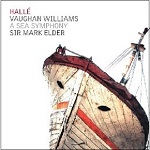 We
now have another fine recording of Symphony No.1 (Sea Symphony)
to add to an already impressive roster, with Sir Mark Elder and the
Hallé Orchestra following up their earlier success with The Wasps
(CDHLD7510) Symphony No.2 (London) and Oboe Concerto (CDHLL7259),
Symphony No. 3 (Pastoral), etc. (CDHLL7540) and Symphonies 5
and 8 (CDHLL7533). The new performance is again on the Hallé’s
own label,CDHLL7542 [70:23] and can be downloaded from emusic.com
by subscribers in 320kbs mp3 for just £1.68. There’s no booklet, but
neither is there from Qobuz
or any of the other download sources that I checked.
We
now have another fine recording of Symphony No.1 (Sea Symphony)
to add to an already impressive roster, with Sir Mark Elder and the
Hallé Orchestra following up their earlier success with The Wasps
(CDHLD7510) Symphony No.2 (London) and Oboe Concerto (CDHLL7259),
Symphony No. 3 (Pastoral), etc. (CDHLL7540) and Symphonies 5
and 8 (CDHLL7533). The new performance is again on the Hallé’s
own label,CDHLL7542 [70:23] and can be downloaded from emusic.com
by subscribers in 320kbs mp3 for just £1.68. There’s no booklet, but
neither is there from Qobuz
or any of the other download sources that I checked.
The ship on the cover shot may be beached and apparently in need of
some attention but the performance needs none, offering strong competition
for the Boult mono*, still my benchmark, and the recording, made live
in the Bridgewater Hall in 2014, does full justice to the large forces
involved.
In addition to the Hallé Orchestra the performers are Katherine Broderick
(soprano), Roderick Williams (baritone), the Hallé Choir, Hallé Youth
Choir, Schola Cantorum of Oxford and Ad Solem.
* Symphonies 1-9 on DECCA British Music 4732412 (5 CDs).
Sea Symphony coupled with The Wasps Suite on NAXOS
Classical Archives 9.80867 or alone on Australian ELOQUENCE 4501442
(download only: prestoclassical.co.uk,
mp3 and lossless).
The complete LSO/Previn recordings (RCA) are now download only and rather
expensive at that.
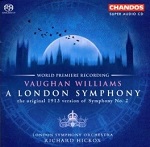 Several
years ago I bought what I still think the ideal recording of VW’s London
Symphony (Symphony No.2), the original 1913 version with some
20 minutes of music which the composer later removed, from the LSO and
Richard Hickox, coupled with George BUTTERWORTH’sThe Banks
of Green Willow on CHANDOS CHAN9902 [67:39] – review.
I bought the CD because I didn’t then have the means to play the SACD
equivalent on CHSA5001.
Several
years ago I bought what I still think the ideal recording of VW’s London
Symphony (Symphony No.2), the original 1913 version with some
20 minutes of music which the composer later removed, from the LSO and
Richard Hickox, coupled with George BUTTERWORTH’sThe Banks
of Green Willow on CHANDOS CHAN9902 [67:39] – review.
I bought the CD because I didn’t then have the means to play the SACD
equivalent on CHSA5001.
I was slightly surprised to find the 24-bit download from theclassicalshop.net
less impressive than the CD: it seems to have been transferred at too
low a level or the dynamic range is too wide and the net result is that
the CD seems to open out more naturally than the download. I also compared
the same recording from eclassical.com
and both 24-bit versions sound a trifle undernourished, even at several
notches higher on the volume, by comparison with the CD whereas the
latter deserves all the praise which was heaped on performance and recording
by my
colleagues in 2001.
Whichever version you choose, CD, SACD, 16- or 24-bit, this is the London
Symphony that I turn to despite strong challenges from Sir Adrian
Boult (the mono recording of all the symphonies, as above, or separately
on Naxos Classical Archives 9.80369 – stream/download from classicsonlinehd.com
or Qobuz)
or Sir Mark Elder (HALLÉ CDHLL7529 – stream/download from
Qobuz: Recording of the Month – review
– review
– DL
News December 2011/1). I’ve also just downloaded the recent DUTTON
recording of the 1920 version of the London Symphony, with the Two-piano
Concerto, inspired by John Quinn's review.
At first hearing I’m every bit as impressed with performances and recording
despite the fact that the download from Amazon
UK is only at 256kbs and comes without booklet.
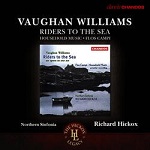 For
me the attraction of the reissued CHANDOS CHAN10870 is not the
principal work, the short opera Riders to the Sea, a work with
which I find it hard to engage, but the beautiful Flos Campi
which concludes the recording and which is as ethereal as his Fantasia
on a Theme of Thomas Tallis and Dives and Lazarus – all three
are even more so than the now ubiquitous The Lark Ascending.
For
me the attraction of the reissued CHANDOS CHAN10870 is not the
principal work, the short opera Riders to the Sea, a work with
which I find it hard to engage, but the beautiful Flos Campi
which concludes the recording and which is as ethereal as his Fantasia
on a Theme of Thomas Tallis and Dives and Lazarus – all three
are even more so than the now ubiquitous The Lark Ascending.
Lossless downloads of this from theclassicalshop.net and Qobuz cost
£7.99 – more than the CD, which is on sale for as little as £6.50 from
one dealer– and the eclassical.com version costs more again at $14.08.
After all that you may think it small consolation that all three downloads
come with the pdf booklet.
Alternatively you may prefer Flos Campi in other company: from
Hyperion with Nobuko Imai as soloist (CDA30025, with Serenade
to Music and Mystical Songs – DL
Roundup October 2010) or with Lawrence Power (CDA67839, with
Suite for Viola and Orchestra and McEwen Viola Concerto – review)
or on Classics for Pleasure (5753112, with Symphony No.5) or
an 4-CD Nimbus set, available from MusicWeb-International
at an attractive price (NI1754).
Sergei RACHMANINOV (1873-1943)
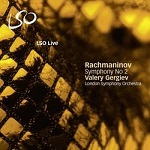
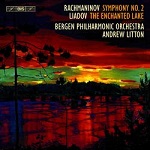 Dan
Morgan has compared
a new recording of Symphony No.2 in e minor, Op.27, from the
Bergen Philharmonic and Andrew Litton, coupled with Liadov The
Enchanted Lake, on BIS-2071 [70:54] with an older recording
from the LSO and Valery Gergiev on LSO LIVE LSO0677 [60:53].
The BIS can be downloaded from
eclassical.com (mp3, 16- and 24-bit lossless) and the LSO from hyperion-records.co.uk
in the same formats1. Both come with pdf booklet.
Dan
Morgan has compared
a new recording of Symphony No.2 in e minor, Op.27, from the
Bergen Philharmonic and Andrew Litton, coupled with Liadov The
Enchanted Lake, on BIS-2071 [70:54] with an older recording
from the LSO and Valery Gergiev on LSO LIVE LSO0677 [60:53].
The BIS can be downloaded from
eclassical.com (mp3, 16- and 24-bit lossless) and the LSO from hyperion-records.co.uk
in the same formats1. Both come with pdf booklet.
He thought highly of the Litton recording but awarded the palm to Gergiev.
Having felt a little disappointed with both, I listened again – perhaps
I can’t shake off memories of old favourites in this work, such as Ormandy
(CBS, now download only2), Previn (mid-price EMI 0852892)
and Rozhdestvensky (a splendid bargain with the LSO on ALTO ALC1250,
stream from Qobuz).
There are two qualities that I look for in a performance of this symphony:
a combination of nostalgia where appropriate and power where it’s needed.
Those older recordings offer both but, having listened again to Gergiev,
he isn’t far behind in either department, though I still prefer, as
I did when I mentioned his version in DL
Roundup August 2010, Previn and Rozhdestvensky: the latter has since
moved from Regis to Alto, still at budget price. The emusic.com mp3
transfer of the LSO LIVE from which I was working then is a little more
expensive now, at £1.68, but still excellent value for subscribers and
sounding decent, though at a low bit-rate of around 225kb/s.
My second encounter with the BIS recording was much more enjoyable,
too: in fact, I marginally preferred both performance and the fuller
recording quality to the LSO Live. I shan’t be getting rid of those
older favourites but the Litton in particular will be joining them.
1 At current exchange rates the 24-bit Hyperion download
is less expensive (£9.75) than the eclassical.com download of the LSO
LIVE version ($16.43) to which Dan Morgan gives a link. You should
be able to find it on SACD for around £9 or $17.
2 Symphonies 1-3 and Vocalise: stream or download
from Qobuz
or stream from Naxos
Music Library.
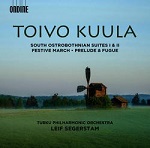
Toivo KUULA (1883-1918)
The two South Ostrobothnian Suites make up the major part of
an Ondine release which David Barker not only made Recording of
the Month – review
– but is actively considering for one of his Recordings of the Year. The performances
by Turku Philharmonic Orchestra and Leif Segerstam make a strong case
for the music and the download is very good. DJB has commented on the
16-bit; I chose the 24-bit – a bit pricey at $19.13 as against $12.75
for the mp3 and 16-bit, but not much more than you would expect to pay
for the 16-bit CD. (ODE1270-2 [70:50] – from eclassical.com,
mp3, 16- and 24-bit lossless, with pdf booklet).
Full marks to my colleague in persuading eclassical.com to get the booklet
provided – originally it was not part of the deal.
Charlie CHAPLIN (1889-1977)
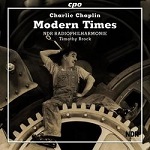 A
reconstruction of Chaplin’s film Modern Times, performed by the
NDR Radiophilharmonie conducted by Timothy Brock, who did the restoration
along with Edward Powell and David Raksin, and recorded it in 2006/7
has been released by CPO (777286-2 [79:49] – from eclassical.com,
mp3 and lossless, with pdf booklet). Rob Maynard’s detailed review
gives the background details. As he says, though the music is keyed
track by track to descriptions of what happens in the film, it’s best
if you actually know the plot, though the music is enjoyable on its
own terms. It’s also available for sampling from Qobuz
but not for streaming when I checked. Naxos Music Library subscribers
can, however, stream it and download the booklet – here
– and classicsonlinehd.com have it here.
A
reconstruction of Chaplin’s film Modern Times, performed by the
NDR Radiophilharmonie conducted by Timothy Brock, who did the restoration
along with Edward Powell and David Raksin, and recorded it in 2006/7
has been released by CPO (777286-2 [79:49] – from eclassical.com,
mp3 and lossless, with pdf booklet). Rob Maynard’s detailed review
gives the background details. As he says, though the music is keyed
track by track to descriptions of what happens in the film, it’s best
if you actually know the plot, though the music is enjoyable on its
own terms. It’s also available for sampling from Qobuz
but not for streaming when I checked. Naxos Music Library subscribers
can, however, stream it and download the booklet – here
– and classicsonlinehd.com have it here.
The theme from Chaplin’s film Limelight, with its clear debt
to Tchaikovsky, was something of a Mantovani speciality; it can be heard
with all the lush strings – hired from the top London orchestras – on
Mantovani at the Movies (Universal, download only). Sample or
stream from Qobuz
but their price of £11.56 for the download is rather steep when Alto
have a similar collection of Mantovani film music recordings from 1955-1960,
including Limelight, for around £5.50 (ALN1923). The
Passionato link which I gave in December
2010 no longer applies.
Sergei PROKOFIEV (1891-1953)
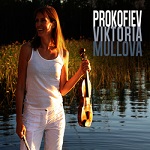 A
new live recording of Violin Concerto No.2 by Viktoria Mullova,
the Frankfurt Radio SO and Paavo Järvi is coupled with the Sonata for
two violins and the solo Violin Sonata on ONYX4142 [50:55].
Awarded Recording
of the Month status by Stephen Greenbank, it can be downloaded
from eclassical.com
(no booklet) in mp3, 16- and 24-bit lossless or streamed from Qobuz
(with booklet) or classicsonlinehd.com
(no booklet and rather expensive, in 16-bit only, at £10.90). Eclassical’s
24-bit at $13.62 is only marginally more expensive than their 16-bit.
A
new live recording of Violin Concerto No.2 by Viktoria Mullova,
the Frankfurt Radio SO and Paavo Järvi is coupled with the Sonata for
two violins and the solo Violin Sonata on ONYX4142 [50:55].
Awarded Recording
of the Month status by Stephen Greenbank, it can be downloaded
from eclassical.com
(no booklet) in mp3, 16- and 24-bit lossless or streamed from Qobuz
(with booklet) or classicsonlinehd.com
(no booklet and rather expensive, in 16-bit only, at £10.90). Eclassical’s
24-bit at $13.62 is only marginally more expensive than their 16-bit.
My only reservation is that I would have preferred the concerto to have
been coupled with its predecessor, but Mullova seems to have a penchant
for No.2, having previously recorded it, with Bartók, Stravinsky and
Shostakovich, for Philips.
If you prefer the two concertos together, Warner have just reissued
the Heifetz/Matacic and Galliera recordings (WARNER Original Jacket
2435628882 ). My own favourite is Kyung Wha Chung, with the
Stravinsky Violin Concerto, on mid-price Decca (E4250032 or 4767226,
the latter a Presto CD licensed from Decca). Alternatively, if you
want a recording of No.1 to go with Mullova’s No.2, another Warner reissue
brings Anne-Sophie Mutter’s account, with Rostropovich (ERATO Original
Jacket 2564613136, with Glazunov and Shchedrin). Both of
these are at mid-price.
Recording of the Month
Sir Arthur BLISS (1891-1975)
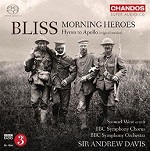
With only one other recording of Morning Heroes in the
catalogue and two of the Hymn to Apollo (here recorded for the
first time in its original 1926 version), a new recording from Chandos
is very welcome: Samuel West, (orator), BBC Symphony Chorus and BBC
Symphony Orchestra conducted by Sir Andrew Davis (CHSA5159, SACD
or download in mp3, 16- and 24-bit lossless, with pdf booklet, containing
texts, from theclassicalshop.net).
Both works were dedicated to the memory of Bliss’s brother who died
in WWI and both have become somewhat neglected. I wouldn’t want to
be without the Warner/EMI recording, with John Westbrook as a most evocative
narrator, but it’s coupled with Sir Simon Rattle’s Britten War Requiem
– an appropriate coupling, well worth having and at budget price, though
not a top recommendation for the Britten – or in a 24-CD set of recordings
by Sir Charles Groves. Far be it from me to dissuade anyone from obtaining
the Groves box – a conductor who did as much as anyone to introduce
me to the world of the classics – but I’m not a fan of monster boxes.
The new recording has another very effective narrator in the form of
Samuel West and the performance is very powerful indeed. West is billed
as ‘orator’ rather than ‘narrator’ and he certainly declaims the texts
but never sounds too ‘actorly’. Some unholy mis-combination of my broadband
and theclassicalshop.net meant that I could listen to this in 16-bit
format only but, with a notch or two up on my normal listening level,
the recording in that form is every bit as good as the performance.
This is yet another confirmation of the extent to which Andrew Davis
has taken on the mantle of interpreter-in-chief of twentieth-century
British music.
Both the alternative recordings of Hymn to Apollo have their
attractions: one comes on a worthwhile 2-for-1 Chandos collection, with
the Checkmate Suite, Clarinet Quintet, Music for Strings and
Pastoral (CHAN241-1 –
review) while the other has Bliss himself at the helm of the LSO
(Bliss Conducts Bliss, Lyrita SRCD.225 – review
– review).
There used to be a budget-price BBC Radio Classics CD of Morning
Heroes, with Richard Baker as narrator, the BBC Chorus and Symphony
Orchestra and Sir Charles Groves again. That’s worth seeking out if
you can find it, especially if it’s not too expensive – Amazon UK have
just one copy for £6.99 as I write.
Discovery of the Month
Jerzy FITELBERG (1903-1951)
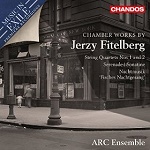
Premiere recordings of Fitelberg’s String Quartets Nos. 1 and 2, Serenade,
Sonatine and Nachtmusik (Fisches Nachtegsang) are
offered in performances by members of ARC Ensemble on CHANDOS CHAN10877
[60:38] – from theclassicalshop.net
(mp3, 16- and 24-bit lossless, with pdf booklet). The subtitle is ‘Music
in Exile 2’: Fitelberg moved from his native Poland first to Paris and
then to the USA. With so few recordings of his music available, I hope
that this will do for him what the recording companies have been doing
for Weinberg recently.
In fact, if you like Weinberg’s music, you should at least check Fitelberg
out. With no benchmarks to judge by, these are persuasive performances
and the 24-bit recording is excellent. As the physical disc is not
an SACD, downloading is the only way to obtain better-than-CD quality.
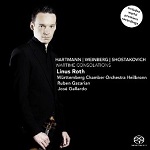 The
main item on a collection entitled Wartime Consolations,
the Concerto Funèbre by Karl Amadeus HARTMANN (1905-1963)
is so well known that Warner once included their Thomas Zehetmair
recording of it in a 4-CD collection entitled 20th-Century
Classics (with Berg and Janácek, now download only or on 15-CD set).
The other items on the new recording, however, are much less familiar:
The
main item on a collection entitled Wartime Consolations,
the Concerto Funèbre by Karl Amadeus HARTMANN (1905-1963)
is so well known that Warner once included their Thomas Zehetmair
recording of it in a 4-CD collection entitled 20th-Century
Classics (with Berg and Janácek, now download only or on 15-CD set).
The other items on the new recording, however, are much less familiar:
- SHOSTAKOVICH Unfinished Sonata (1945) for Violin and
Piano (first recording)
- WEINBERG Concertino, Op.42; Rhapsody on Moldavian
Themes, Op. 47/3. There are other recordings of the Concertino
but this is the premiere of the Rhapsody in its (reconstructed)
orchestrated form. (For another recording featuring these two works,
please see Brief Reviews below).
The performers are Linus Roth (violin) with the Württemberg Chamber
Orchestra Heilbronn/Ruben Gazarian and José Gallardo (piano) (CHALLENGE
CLASSICS CC72680 [55:26] – from
emusic.com, 320kbs mp3). In the Hartmann I still marginally prefer
Alina Ibragimova and the Britten Sinfonia (HYPERION CDA67547,
with solo works by Hartmann – review
– DL
News 2012/14) but the coupling on the new recording is more enticing
and all the performances are commendable. It’s good to see the Württemberg
Orchestra who, under Jörg Faerber, used to be a mainstay of the Vox
Turnabout label, making successful returns to the recorded repertoire.
There’s also a Supraphon recording of the Hartmann from Ida Haendel
and Karel Ancerl, with Ravel and Lalo, which I like (SU3677-2
– DL
News 2013/8).
At £3.78 for subscribers the emusic download is quite a bargain and
the transfer, like all their recent releases, is at 320kbs. Qobuz
have it to sample and for members to stream or download (£7.99) in 16-bit
lossless but seekers for 24-bit will have to purchase the SACD.
Leonard BERNSTEIN (1918-1990)
Missa Brevis (1988)1 [10:31]
Symphony No. 3 ‘Kaddish’ (original version, 1963)2 [42:32]
The Lark (1955/2008/2012)3 [16:34]
Claire Bloom (Narrator)2,3
Kelley Nassief (Soprano)2
Paulo Mestre (Countertenor)1,3
The Maryland State Boychoir2; The Washington Chorus2
The São Paulo Symphony Choir1/3; Members of the São Paulo
Symphony Orchestra1/3; Baltimore Symphony Orchestra2/Marin
Alsop 1-3
rec. Sala São Paulo, São Paulo, Brazil, 29-and 30 November, 2012, and
live at The Joseph Meyerhoff Symphony Hall, Baltimore, Maryland, USA,
28 and 30 September, 2012
Texts and translations included
NAXOS AMERICAN CLASSICS 8.559742 [69:40] – from classicsonline.hd.com
(stream or download in 16- and 24-bit lossless, with pdf booklet).
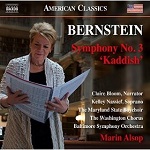 Naxos
already had a fine recording of the Kaddish Symphony, with Willard
White, Yvonne Kenny and Liverpool forces conducted by Gerard Schwarz
(8.559456 – review).
Who better, however, in theory than Bernstein protégée Marin Alsop to
conduct his music, especially now that his own CBS recording is available
only in a Sony monster box and his even better DG recording, with Chichester
Psalms, as a download only?
Naxos
already had a fine recording of the Kaddish Symphony, with Willard
White, Yvonne Kenny and Liverpool forces conducted by Gerard Schwarz
(8.559456 – review).
Who better, however, in theory than Bernstein protégée Marin Alsop to
conduct his music, especially now that his own CBS recording is available
only in a Sony monster box and his even better DG recording, with Chichester
Psalms, as a download only?
I hope that the DG recording will return, perhaps, like Symphonies Nos.
1 and 2, on the Originals label, though that CD has appropriatedChichester
Psalms, originally coupled with the Third Symphony (4577572).
Meanwhile, it can be streamed or downloaded in lossless sound from Qobuz
(£11.56), as can the Sony from classicsonlinehd.com
for £9.63. If you feel like splashing out, Qobuz
also have the 7-CD Bernstein conducts Bernstein box set for £30.93.
The DG is available in mp3 from
7digital.com for £8.49. If you are happy with 320kb/s mp3, sainsburysentertainment.co.uk have the Sony version, oddly coupled
with the Bizet Symphony in C, for £3.99. Alternatively they
offer it, more logically, in the same coupling as COL, for £6.99 – here.
Claire Bloom speaks the narration beautifully on the new recording but
you will need to turn up the volume to hear her and then the orchestra
may sound overpowering – and harmful to your relations with your neighbours.
Perhaps I’m looking for something more impassioned, such as Felicia
Montealegre, aka Mrs Bernstein, gave us on that CBS/Sony recording.
That’s my only reservation in recommending the new recording – I suggest
that you sample first to gauge your own reaction because of the other
reviews which I’ve seen one shares my reservation, the other to a much
lesser extent. In any case, if you prefer the original narration, as
I do, this is now your version of choice: the alternative Chandos recording
uses Jamie Bernstein’s revised version. That Leonard Slatkin recording
is otherwise a strong competitor (CHAN10172 – from theclassicalshop.net,
mp3 and lossless, with pdf booklet; also available as SACD CHSA5028).
In all other respects there is very little to choose between Slatkin
and Alsop: both are idiomatic interpreters of Bernstein. Slatkin adds
the Chichester Psalms, frankly a superior work to the two offshoots
from the music for Anouilh’s play about Joan of Arc, L’Alouette.
The liturgical music was reborn as the Missa Brevis and some
of the other music as The Lark, here narrated more appropriately
than in Kaddish by Claire Bloom. If you already have Marin Alsop’s
Naxos recording of Chichester Psalms1 – well worth
considering if you don’t – the mixture of rustic-medieval and Bernstein’s
typically bouncy rhythms in these works is very attractive as performed
here, especially if you play not only the Missa Brevis but also
The Lark before Kaddish.
The 24-bit download is excellent and COL’s downloads in that format
are not unreasonably priced now that they have reduced from £11.99 to
£9.99. The 16-bit costs £4.99 and both come with the booklet.
1 review
– review
– review.
Bargain of the Month
Malcolm ARNOLD (1921-2006)
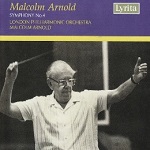 Though
I’ve reviewed both of the complete series of Arnold’s symphonies from
Naxos (Andrew Penny, now only available separately – review
and review
of box set) and Chandos (Richard Hickox and Rumon Gamba, CHAN10853,
4 CDs – review)
and enjoyed both, I somehow missed Symphony No.4, Op.71, in the
Lyrita recording which the composer himself made with the London Philharmonic
Orchestra (SRCD.200 [54:08]), an omission easily remedied for
as little as £1.68 by downloading it from emusic.com.
Though
I’ve reviewed both of the complete series of Arnold’s symphonies from
Naxos (Andrew Penny, now only available separately – review
and review
of box set) and Chandos (Richard Hickox and Rumon Gamba, CHAN10853,
4 CDs – review)
and enjoyed both, I somehow missed Symphony No.4, Op.71, in the
Lyrita recording which the composer himself made with the London Philharmonic
Orchestra (SRCD.200 [54:08]), an omission easily remedied for
as little as £1.68 by downloading it from emusic.com.
The performance must be regarded as authoritative and the recording
does it justice. As good as those other recordings are, this is likely
to become my version of choice. The emusic.com bit-rate is not ideal
– it hovers between 160 and 192kbs – but sounds more than tolerable.
There’s no booklet, but the MusicWeb review
and review1
will help you fill in the details. If you don’t subscribe to emusic,
rather than downloading from Amazon for considerably more – and still
likely to be at a less-than-ideal bit-rate and without booklet – consider
purchasing the CD at an attractive price from Music-Web
International.
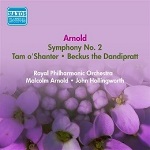 Arnold’s
own earlier (1955)2 recording with the RPO of Symphony
No.2 and Beckus the Dandipratt is also available on an inexpensive
NAXOS Classical Archives download (9.80386 [41:06] with
Tam O’Shanter, conducted by John Hollingsworth). Sample or purchase
from Qobuz:
only one track is available for streaming, but it is all available to
subscribers to stream from classicsonlinehd.com.
The transfer is very good for its age, but there’s just one grumble:
Naxos Classical Archive downloads used to be available in good mp3 from
the old classicsonline.com for £1.99: the increase to £4.99 (just reduced
from £5.99) for lossless downloads from its successor seems rather steep
when we don’t even get a booklet – that’s the same price as for 16-bit
downloads of recent Naxos recordings which are usually much longer than
41 minutes and do come with a booklet.
Arnold’s
own earlier (1955)2 recording with the RPO of Symphony
No.2 and Beckus the Dandipratt is also available on an inexpensive
NAXOS Classical Archives download (9.80386 [41:06] with
Tam O’Shanter, conducted by John Hollingsworth). Sample or purchase
from Qobuz:
only one track is available for streaming, but it is all available to
subscribers to stream from classicsonlinehd.com.
The transfer is very good for its age, but there’s just one grumble:
Naxos Classical Archive downloads used to be available in good mp3 from
the old classicsonline.com for £1.99: the increase to £4.99 (just reduced
from £5.99) for lossless downloads from its successor seems rather steep
when we don’t even get a booklet – that’s the same price as for 16-bit
downloads of recent Naxos recordings which are usually much longer than
41 minutes and do come with a booklet.
The transfer of the Symphony and Beckus on Arnold conducts
Arnold (EMI: Bargain of the Month – review)
seems to have been deleted: someone is asking £39.99 at Amazon UK, so
it’s no longer much of a bargain, but it’s available to stream and download
from Qobuz,
albeit without booklet. If you are happy with 320kbs mp3, sainsburysentertainment.co.uk have it for £7.49 – again no booklet.
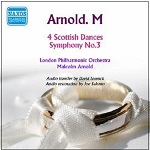
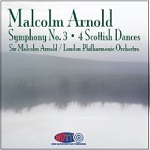 Of
rather later vintage, Arnold’s own recording of Symphony No.3
and Scottish Dances with the LPO is on NAXOS Classical Archives
9.80892 – from eclassical.com
($7.99) or classicsonlinehd.com
(£4.99), mp3 and lossless. It’s worth going for the lossless version
of this recording, which was recorded by Everest in 1959 and released
by World Record Club in stereo in 1961 (ST99). Arnold tended to slowish
speeds in his recordings – not, however, in the Second (above) – but,
though Penny (Naxos, 11:11) and Hickox (Chandos, 12:20) take the first
movement of the symphony faster than his 13:23, there’s no sense that
he lets the music drag. There are no notes with the Naxos Classical
Archive series.
Of
rather later vintage, Arnold’s own recording of Symphony No.3
and Scottish Dances with the LPO is on NAXOS Classical Archives
9.80892 – from eclassical.com
($7.99) or classicsonlinehd.com
(£4.99), mp3 and lossless. It’s worth going for the lossless version
of this recording, which was recorded by Everest in 1959 and released
by World Record Club in stereo in 1961 (ST99). Arnold tended to slowish
speeds in his recordings – not, however, in the Second (above) – but,
though Penny (Naxos, 11:11) and Hickox (Chandos, 12:20) take the first
movement of the symphony faster than his 13:23, there’s no sense that
he lets the music drag. There are no notes with the Naxos Classical
Archive series.
The lossless transfer from eclassical and classicsonlinehd is good but
those in search of 24/96 quality will find an even better version, with
pdf booklet, from
High Definition Tape Transfers for $14.00 – reduced as I write
to $11.20 – and in other formats, including DSD. On Naxos the Dances
come first, which I find more logical; on HDTT the order is reversed
but the recorded sound, from a 15 i.p.s. tape, is stunningly good.
Yet another very attractive transfer of this recording of the Third
Symphony comes from Beulah on a well-filled album with BUTTERWORTH
( A Shropshire Lad) and VAUGHAN WILLIAMS (Symphony No.3,
Sir Adrian Boult, mono). (5PD76 –
Download News 2013/16 ).
The Everest release on SDBR3021, with Dances first, has
been intermittently available in the UK. Dan Morgan reviewed the 24/96download
from HD Tracks – review.
UK purchasers can now pay there in sterling.
1 The footnote to that review really belongs with another
Arnold recording on Lyrita
2 The date is given as 1957 but it can’t be: the Philips
LP was reviewed in 1955.
Lukas FOSS (1922-2009)
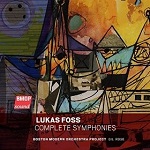 The
recorded repertoire of the music of Lukas Foss remains somewhat small.
Much of what there is has been immured in multi-disc collections, features
on multi-composer albums or is available only to download. I hope that
the fact that the 2008 Harmonia Mundi recording of his Piano Concertos,
with Foss himself among the soloists, has fallen into the last category
(HMU9072431 – from
eclassical.com or Qobuz,
both mp3 and lossless – NO booklet) is not an ominous sign for new recordings
of his music.
The
recorded repertoire of the music of Lukas Foss remains somewhat small.
Much of what there is has been immured in multi-disc collections, features
on multi-composer albums or is available only to download. I hope that
the fact that the 2008 Harmonia Mundi recording of his Piano Concertos,
with Foss himself among the soloists, has fallen into the last category
(HMU9072431 – from
eclassical.com or Qobuz,
both mp3 and lossless – NO booklet) is not an ominous sign for new recordings
of his music.
To the best of my knowledge no recording of the Four Symphonies,
composed between 1944 and 1995, has appeared before, at least in the
UK catalogue. Now the Boston Music Orchestra Project, directed by Gil
Rose, have recorded them on a new 2-disc set, on their own label BMOP/SOUND
1043 [74:10 + 77:14] available to sample, stream or download from
Qobuz.
Though Foss played with atonalism and even wrote of his later music
that it was as crazy tonally as it had previously been crazily atonal,
there’s nothing in these symphonies to frighten off any lover of the
classical mainstream from Bach to Stravinsky, both of them influences
on Foss. Since he was principally associated with Boston, it’s appropriate
that BMOP should
have made these authoritative recordings on the eve of their twentieth
anniversary.
The downloads reached me as press reviews in wav format, so I cannot
comment on the Qobuz downloads, but the wav transfers sound fine. At
£11.99, the Qobuz version is both less expensive than the offering from
Amazon UK and of higher quality than the latter, which is mp3 only and
likely to be at only 256kbs. Subscribers to emusic.com will find it
there
for £6.73: like all their recent releases it’s at the full mp3 bit-rate
of 320kbs.
Amazon
US have these recordings both as a download and as a 2-SACD set.
If you missed reviews by John France and myself of the earlier BMOP
release of music by Irving Fine, you can find them here
and here.
My review of their recording of music by Elena Ruehr is here.
1 We seem to have missed the recording of the Piano Concertos.
If anything, they are even more attractive than the symphonies or, at
least, a next step if you try the symphonies and like them – check for
yourself from Qobuz
(sampling only for non-subscribers).
Contemporary Music
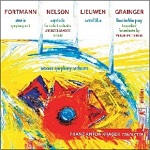 Regular
readers will know that my appreciation of modern classical music and
jazz is hedged around with caution, but I’m always willing to explore,
which is why I was tempted by the very snazzy cover and tried DIVINE
ART MÉTIER MSV28554 from theclassicalshop.net
(mp3 and lossless, with pdf booklet). The programme opens with the
most substantial work, Thomas FORTMANN’s Symphony No.2 (Etruria)
(2009), followed by Robert NELSON’s Capriccio for violin
and orchestra (2007), Peter LIEUWEN’s Astral Blue (2006)
and concludes with Merlin PATTERSON’s orchestral arrangement
of Percy Grainger’s Lincolnshire Posy. Franz Anton Krager conducts
the Moores Symphony Orchestra, University of Houston School of Music,
with Andrzej Grabiec as soloist in Capriccio.
Regular
readers will know that my appreciation of modern classical music and
jazz is hedged around with caution, but I’m always willing to explore,
which is why I was tempted by the very snazzy cover and tried DIVINE
ART MÉTIER MSV28554 from theclassicalshop.net
(mp3 and lossless, with pdf booklet). The programme opens with the
most substantial work, Thomas FORTMANN’s Symphony No.2 (Etruria)
(2009), followed by Robert NELSON’s Capriccio for violin
and orchestra (2007), Peter LIEUWEN’s Astral Blue (2006)
and concludes with Merlin PATTERSON’s orchestral arrangement
of Percy Grainger’s Lincolnshire Posy. Franz Anton Krager conducts
the Moores Symphony Orchestra, University of Houston School of Music,
with Andrzej Grabiec as soloist in Capriccio.
Divine Art’s willingness to record what might seem like music of niche
interest on the Métier label is well worthy of your support and I urge
you give this and some of their other recordings at both ends of the
chronological scale a try. Towards the other end of that scale, it’s
thanks to the support of first Naxos, then Divine Art and more recently
Linn that we have been able to have some fine recordings of the music
of Charles Avison and now of other baroque composers from the ensemble
which bears his name.
The Etruria Symphony is a powerful work, not easy to grasp at
first hearing, but well worth persevering with: I intend to do so.
Parts of it are somewhat craggy but it’s never noisy simply for the
sake of being so and much of it is no more avant-garde than Aaron
Copland.
The other music is very approachable, even for someone with conservative
musical tastes. I’m particularly attached to Grainger’s own wind version
ofLincolnshire Posy – most economically obtained on a super-budget
Chandos sampler from their Grainger series, CHAN2029: Bargain
of the Month – review
1 – but the Patterson arrangement is also very enjoyable.
I see that John France also enjoyed this recording – review.
1 also on an inexpensive Australian Eloquence reissue of
the classic Eastman Rochester recording with Frederick Fennell (4802089
– review).
Bargain of the Month
Pēteris VASKS (b.1946)
Sala – Island: Symphonic Elegy for Orchestra [20:35]
Musica Appassionata per orchestra d’archi [18:00]
Credo (2010) [21:04]
Liepaja Symphony Orchestra/Atvars Lakstigala
WERGO WER73232 [59:39] – from emusic.com
(320kb/s mp3, £1.26: NO booklet).
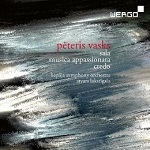 I
must admit that I don’t often check releases on the Wergo label – they
tend to be too avant-garde for my liking – but the music of Vasks
is a different matter entirely and the price being asked by emusic.com
is absurdly inexpensive for the work of a composer who resists gimmicks,
believing in ‘art for mankind’ rather than ‘art for art’s sake’. With
a strong spiritual element, the nearest analogues that I can suggest
are Arvo Pärt and John Tavener. It’s not ‘easy’ music and it’s not
imitative of the past but it does stand in a clear line of descent from
the mainstream.
I
must admit that I don’t often check releases on the Wergo label – they
tend to be too avant-garde for my liking – but the music of Vasks
is a different matter entirely and the price being asked by emusic.com
is absurdly inexpensive for the work of a composer who resists gimmicks,
believing in ‘art for mankind’ rather than ‘art for art’s sake’. With
a strong spiritual element, the nearest analogues that I can suggest
are Arvo Pärt and John Tavener. It’s not ‘easy’ music and it’s not
imitative of the past but it does stand in a clear line of descent from
the mainstream.
These are all first recordings, so there’s no benchmark, but the performances,
from Vasks’ native Latvia, make an excellent case for the music; the
recording is good and the transfer comes at full-strength 320kb/s.
Now all we need is for emusic.com to bring all their earlier downloads
up to 320kb/s standard – some are at only half that bit-rate – and to
start giving us the notes. Oh, and to stop charging ridiculous prices
for budget-price recordings which happen to have lots of tracks – charging
£0.42 per track is fine but there ought to be a cap.
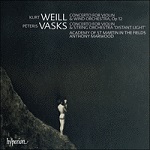
The Hyperion recording of VASKS’ Violin Concerto, ‘Distant Light’,
is also something of a bargain. Because the playing time is a little
short [56:46] the price for mp3 or lossless is just £6.99. The soloist
and conductor here and in the Kurt WEILL Violin Concerto, Op.12,
coupling is Anthony Marwood and the orchestra is the Academy of St Martin
in the Fields. (CDA67496 – from hyperion-records.co.uk).
Tony Haywood liked the contrast between the style of Vasks and the spiky
neo-classicism of Weill and praised both performance and recording;
it remains only for me to echo with enthusiasm his comments – review
– and add that the download, costing not much more than the CD but coming
with pdf booklet, is equally credit-worthy. If you crave the physical
product you could print the booklet, burn to CD and still save money.
Don’t hit the iTunes purchase button to pay almost £1 more for mp3 which
comes at a less than ideal bit-rate and is devoid of booklet.
Jazz Bargain of the Month
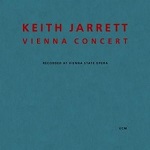
Keith Jarrett’s Vienna Concert, recorded at the Staatsoper
in 1991 (ECM1481 [68:08]) comes on just two tracks at a total
price of £0.84 from emusic.com.
It’s an ideal purchase for emusic.com subscribers who find themselves,
as I often do, with a few pence left on the account at the end of the
month when it will be lost forever. Jarrett’s many fans will find this
every bit as wonderful as his Paris and Köln concerts – if they don’t
already own it – and classical music fans should find this just as tempting.
The bit-rate is not idea – around 220kbs – but that’s not much lower
than from Amazon, where it costs £7.99, or iTunes, where it’s £9.99.
If you want it in lossless sound, that will cost you £10.79 from Qobuz
– quite a difference. Some UK dealers seem no longer to stock the CD
– Amazon had only one copy left at the time of writing.
Late arrivals and brief notices
A brief notice does not preclude a later review in DL News or on the
main MusicWeb pages.
Martin CODAX was an early minstrel of Galician-Portuguese heritage,
the composer of Cantigas de amigo (mid thirteenth-century) and
often regarded as the precursor of the Portuguese fado. A new
recording on ARCANA (A390) contains beautiful performances
by Vivabiancaluna Biffi (voice and viola d’arco) and
Pierre Hamon (medieval flutes). The booklet contains the texts and
translations. It hadn’t yet appeared on general release at the time
of writing – I listened to a press preview – but Arcana downloads are
usually available from eclassical.com.
The only other recording devoted entirely to these Cantigas,
on Harmonia Mundi HMC2907378/79, 2-for-1 when available on CD,
is now download only – eclassical.com
(mp3 and lossless) or Qobuz
(stream or download). No booklet from either.
Girolamo FRESCOBALDI (1583-1643) Toccate d’Intavolatvra di
Cimbalo et Organopartite di Diverse Arie e Corrente, Balletti, Ciaccone,
Passaghagli Libro Primo MDCXXXVII is a very long title for a 2-CD
collection of keyboard works, attractively performed, half on the harpsichord
and half on the organ by Rinaldo Alessandrini. First released by Auvidis
in 1993 it’s now reissued by ARCANA (A388). Stream –
sample for non-subscribers – or download from Qobuz
or stream from Naxos
Music Library.
Samuel SCHEIDT (1587-1654) Ludi Musici (1621), an enjoyable
collection of dance music, is performed in style by L’Achéron, a group
forming what used to be called a broken consort (viols and other instruments)
on RICERCAR RIC360. Again, I’ve been listening to a preview
of what should appear in due course from eclassical.com but is already
available to stream – sample for non-subscribers – or download from
Qobuz.
What Artemesia Heard is a programme of music that might
have been heard by the artist Artemisia Gentileschi (1593-1653). It's
performed by Jennifer Ellis Kampani, Nell Snaidas, Céline Ricci
(soprano), Paul Shipper (bass) and El Mundo/Richard Savino on SONO
LUMINUS DSL92195 - see my full
review. Download from eclassical.com
(mp3, 16- and 24-bit lossless, with pdf booklet).
Alessandro STRADELLA (1639-1682) San Giovanni Crisostomo
is an oratorio for 5 voices and basso continuo, performed by Ensemble
Mare Nostrum/Andrea De Carlo (ARCANA A389). It’s a first recording
of a work overshadowed by another Stradella oratorio, San Giovanni
Battista: the theme is the contest between vanity and virtue, presented
in lively style. If you listened with an innocent ear you could be
forgiven for thinking it an early opera: the two forms had much in common
at this stage. Even the mp3 which I received for review sounds well
and it comes with text and translations Subscribers can stream from
Qobuz;
others can sample. It’s also available for download there.
Stradella’s La forza delle stelle ovvero Il Damone, with the
same forces, is available on A377, from eclassical.com
(mp3, 16- and 24-bit lossless, with pdf booklet): Discovery of
the Month, 2014/10.
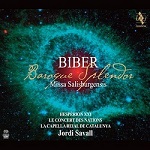 Heinrich
BIBER (1644-1704). In addition to the three new recordings of the
Rosary Sonatas discussed above, I have discovered that I missed
yet another earlier this year, from Gunar Letzbor (violin) and Ars Antiqua
Austria on ARCANA A381. Stream or download from Qobuz:
non-subscribers can sample. A first listen suggests that this is another
competitive version.
Heinrich
BIBER (1644-1704). In addition to the three new recordings of the
Rosary Sonatas discussed above, I have discovered that I missed
yet another earlier this year, from Gunar Letzbor (violin) and Ars Antiqua
Austria on ARCANA A381. Stream or download from Qobuz:
non-subscribers can sample. A first listen suggests that this is another
competitive version.
There's a first-rate new recording of Biber's Missa Salisburgensis,
with La battalia and Sonata Sancti Polycarpis,
subtitled Baroque Splendor, directed by Jordi savall on his own
ALIA VOX label. (AVSA9912). I reviewed the SACD - here
- and it can be streamed or downloaded, with pdf booklet, from Qobuz
in 16- and 24-bit formats, though the latter won't leave you with very
much change as opposed to the SACD. You can compare it with the McCreesh
recording there, too: I now think that it marginally outshines even
that classic album.
Alessandro SCARLATTI (1660-1725). Arias and duets entitled
Rosinda ed Emireno, performed by Alice Borciani (soprano), Alex
Potter (countertenor) and Musica Fiorita/Daniel Dolci suggest that the
whole opera from which they derive, L’Emireno, would be worth
recording. (PAN CLASSICS PC10303 – from eclassical.com,
mp3 and lossless, with pdf booklet containing Italian texts and German
translations – no English). My colleague Johan van Veen has reviewed
this on
his own valuable website.
Johann Sebastian BACH (1685-1750). The recording of the Cello
Suites and the Sonatas for Gamba and Harpsichord which I included in
my survey
of recent Outhere group recordings from an mp3 press preview (ARCANA
A383) is now available in a better format from eclassical.com
(mp3 and lossless, with pdf booklet). At $37.83, however, you will
have little if any change from the cost of the CDs – £22.68 from
Amazon UK and $37.49 from
arkivmusic.com. Stream from Naxos
Music Library.
George Frideric HANDEL (1685-1759). The well-known Fireworks
Music is coupled with the three much less known Concerti a due
cori in performances by Zefiro/Alfredo Bernardini on ARCANA A386,
a reissue of a Deutsche Harmonia Mundi release. Ralph Moore’s review
reflects my own feelings: ‘This is a thoroughly enjoyable disc which
should appeal to any devotee of Handel’s instrumental music and not
just for the ebullient performance of the title piece’. Stream – non-subscribers
sample – or download from Qobuz.
Stream from Naxos
Music Library.
Sonatas for keyboard, viola da gamba and continuo by Carl Philipp
Emanuel BACH (1714-1788), Johann Gottlieb GRAUN (1703-1771) and
one attributed to Ludwig Christian HESSE (1716-1772) are performed
by Lucile Boulanger (viola da gamba), Arnaud de Pasquale (fortepiano)
and Laurent Stewart (fortepiano) on ALPHA202 [71:49] – from eclassical.com
(mp3, 16- and 24-bit lossless, with pdf booklet). There’s not much
competition – nothing that combines even the three CPE Bach works and
none at all for the Graun or the Hesse attribution. The performances
are stylish but haters of the fortepiano should be aware that this is
not one of the more mellifluous examples. Subscribers can stream, others
can sample from Qobuz.
Franz Anton HOFFMEISTER (1754–1812) is best known as the dedicatee
of Mozart’s String Quartet No.20, K499. His late Symphonies
in C (Hickman C8) and in D (Hickman D8) are coupled with the overture
Der Königssohn aus Ithaka in performances by Orchestra della
Svizzera Italiana and Howard Griffiths on CPO 777895-2 – from
eclassical.com
(mp3 and lossless, with pdf booklet). The only other recording of the
Symphony in D is on a pioneering recording, CHANDOS CHAN10351
(with Symphonies in E and G) and there doesn’t seem to be any other
current recording of the one in C.
ALPHA225 is a 5-CD set of reissues on which Anima Eterna and
Jos van Immerseel perform music by BERLIOZ (Symphonie Fantastique
andCarnaval Romain), DEBUSSY (L-Après-midi d’un Faune,
la Mer and Images), RAVEL (Ma Mère l’Oye
– Suite, Pictures from an Exhibition, Boléro, Pavane pour
une Infante défunte, Rapsodie Espagnole and La Valse) and
POULENC (2-Piano Concerto, Suite Française and Concert
Champêtre). Recorded over an eight-year period (2005-2013), these
period-instrument recordings have appeared separately before on the
Zig-Zag label, but the 5-disc set costs the price of just two of them.
Most of these recordings have been welcomed – the Berlioz, for example,
held my attention throughout – DL
Roundup September 2011/2 and Oleg Ledeniov warmly welcomed the Poulenc
– review
– but Nick Barnard found the Mussorgsky/Ravel ‘a desert of disappointment’
– review.
Once more I listened to an mp3 preview: when it appears as a download,
I wouldn’t, for once, recommend eclassical.com, whose per-second charging
policy is likely to equal the cost of the five individual albums.
Auguste FRANCHOMME (1808-1884). The Franchomme Project
offers an attractive programme of newly discovered works by this renowned
French cellist, together with transcriptions of music by Chopin, who
chose Franchomme as his chamber music partner. The performances are
by Louise Dubin (cello and research), with Julia Bruskin, Sæunn Thorsteinsdóttir
and Katherine Cherbas, (cello), Hélène Jeanney and Andrea Lam (piano).
(DELOS DE3469). It’s due for release on 30 October but available
to stream or download in advance, from Qobuz
and in mp3, 16- and 24-bit download from eclassical.com.
Both come with booklet. My review copy came via press access in very
good wav sound, so I can’t comment on the quality from Qobuz and eclassical.com
but I imagine that they sound fine, too.
Wilhelm FITZENHAGEN (1848-1890). I might well have passed Fitzenhagen’s
two Cello Concertos by if I had not been doing the htm conversion for
Michael Cookson’s review.
The performances by Alban Gerhardt (cello) and the Deutsches Symphonie-Orchester
Berlin/Stefan Blunier make the best case for the music and of the admittedly
much more memorable coupling, TCHAIKOVSKY Rococo Variations,
which Fitzenhagen, their dedicatee, arranged in a version which held
the field until the recent tendency to return to the original. The
24-bit download is at 24/48 but none the worse for that. (HYPERION
CDA68063 – from hyperion-records.co.uk,
mp3, 16- and 24-bit lossless, with pdf booklet).
Isaac ALBÉNIZ (1860-1909). I thought that I had reviewed Piano
Music Volume 6, containing the Piano Concerto and Piano Sonata
No.5 (BIS-CD-1743) some time ago but I can’t find it among the
DL Roundup/DL News editions. Reviews by Dan
Morgan and John
France tell you all that you need to know about this attractive
release, together with the fact that the download from eclassical.com
is in mp3, 16- and 24-bit lossless, with pdf booklet.
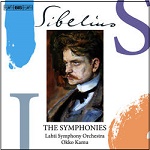 Jean
SIBELIUS (1865-1957). I wondered at the commercial viability of
BIS’s new 3-SACD set of the symphonies from the Lahti Symphony Orchestra
and Okko Kamu (BIS-2076 – from eclassical.com,
mp3, 16- and 24-bit lossless, with pdf booklet), given that they already
had a very fine complete set with the same orchestra and Osmo Vänskä1,
plus remakes of four symphonies with Vänskä and the Minnesota Orchestra.
In the event, the early promise of Kamu’s recordings of some of the
symphonies for DG is more fully realised here, though the fifth symphony
is something of a slow burner in his hands. The SACDs, due for release
at the end of October 2015, sell for around £23: I'm surpised that eclassical
have two versions - the one which I've listed offers all formats for
$24, the other mp3 and 16-bit for $25.21 and 24-bit for $35.29. I’m
not quite sure that I go all the way with Dan Morgan’s award of Recording
of the Month – I still marginally prefer Vänskä, the Lahti
set rather than the Minnesota remakes – but I’d be perfectly happy if
this were my only set of Sibelius recordings.
Jean
SIBELIUS (1865-1957). I wondered at the commercial viability of
BIS’s new 3-SACD set of the symphonies from the Lahti Symphony Orchestra
and Okko Kamu (BIS-2076 – from eclassical.com,
mp3, 16- and 24-bit lossless, with pdf booklet), given that they already
had a very fine complete set with the same orchestra and Osmo Vänskä1,
plus remakes of four symphonies with Vänskä and the Minnesota Orchestra.
In the event, the early promise of Kamu’s recordings of some of the
symphonies for DG is more fully realised here, though the fifth symphony
is something of a slow burner in his hands. The SACDs, due for release
at the end of October 2015, sell for around £23: I'm surpised that eclassical
have two versions - the one which I've listed offers all formats for
$24, the other mp3 and 16-bit for $25.21 and 24-bit for $35.29. I’m
not quite sure that I go all the way with Dan Morgan’s award of Recording
of the Month – I still marginally prefer Vänskä, the Lahti
set rather than the Minnesota remakes – but I’d be perfectly happy if
this were my only set of Sibelius recordings.
1 Sibelius Edition, Volume 12, BIS-1933/35, 5-for-3,
including earlier versions and variants. Stream or download from Qobuz
until the eclassical.com reissue of this volume becomes available towards
the end of 2015.
Arnold SCHÖNBERG (1874-1951) Pelleas und Melisande ; Violin
Concerto - Kolja Blacher (violin) Gürzenich-Orchester Köln/Markus Stenz
OEHMS CLASSICS OC455 [69:35]. This is another recording which
caught my eye as I was processing another reviewer’s work, in this case
Dominy
Clements. I’m not a great fan of Schoenberg at his grittiest but
I love Pelleas and this recording does it full justice. The
concerto is a tougher nut – more challenging than the Berg with which
it’s sometimes coupled – but this recording might win me round. From
eclassical.com
(mp3 and lossless, with pdf booklet).
Mieczyslaw WEINBERG (1919-1996). The Concertino, Op.42,
for violin and string orchestra, Rhapsody on Moldavian Themes,
Op. 47/3, for violin and orchestra and Symphony No.10, Op.98, for string
orchestra are performed by Ewelina Nowicka (violin) and the Amadeus
Chamber Orchestra of Polish Radio conducted by Agnieszka Duczmal (Opp.
42 and 47/3) and Anna Duczmal-Mróz on CPO 777887-2 – from eclassical.com
(mp3 and lossless, with pdf booklet).
BEULAH have added two more selections of French Music. Music
of France 3, combines Adolphe ADAM the Büsser abridged
version of Giselle (Paris Conservatoire Orchestra/Albert Wolff,
1958 stereo) with an incongruous bedfellow, François COUPERIN
Les Concerts Royaux No.3 (Camerata instrumentale der Hamburger
Telemann-Gesellschaft, from DG Archiv, 1959 stereo) on 3PD87
– from
Amazon UK or iTunes
(both mp3). The Wolff recording of Giselle is something of a
classic if the abridged version is enough. I haven’t heard the Australian
Eloquence reissue on a 2-CD set with other music that you may not want,
but the Beulah transfer makes the recording sound much better than when
I last heard it on a Decca Eclipse LP and this release is well worth
having for Giselle alone.
I hadn’t heard the Couperin before but the performance is rather joyless
and the sound somewhat thin.
Music of France 4 offers a more coherent programme and
one which I enjoyed: Maurice RAVEL Boléro (Paris Conservatoire
Orchestra/Albert Wolff, 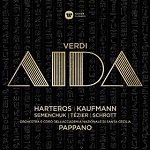 1958
stereo), Darius MILAUD La Création du Monde (Paris Conservatoire
Orchestra/Georges Prêtre, 1962 stereo), Claude DEBUSSY Nocturnes
(Concertgebouw/Eduard van Beinum, 1958 stereo) and Francis POULENC
Organ Concerto (Maurice Duruflé, French National Radio Orchestra/Georges
Prêtre, 1961 stereo). The performances can hold their heads up with
the best and the transfers belie their age. (4PD87 - from Amazon
UK or iTunes, both mp3).
1958
stereo), Darius MILAUD La Création du Monde (Paris Conservatoire
Orchestra/Georges Prêtre, 1962 stereo), Claude DEBUSSY Nocturnes
(Concertgebouw/Eduard van Beinum, 1958 stereo) and Francis POULENC
Organ Concerto (Maurice Duruflé, French National Radio Orchestra/Georges
Prêtre, 1961 stereo). The performances can hold their heads up with
the best and the transfers belie their age. (4PD87 - from Amazon
UK or iTunes, both mp3).
Finally, I predict that I shall be making the new Warner recording of
VERDI’s Aïda, with its starry cast directed by Antonio
Pappano, a Recording of the Month. With the 3-CD set on sale for as
little as £12.99 from one supplier I can recommend streaming from Qobuz,
with booklet, but I have yet to find a lossless download source that
costs less or even the same as the CDs. Even in mp3, the 7digital.com
price of £12.49 – with pdf booklet – will save only pence. £11.99 from
sainsburysentertainment.co.uk looks more tempting, but the bit-rate
is only 256kbs and there is no booklet.



 All Nimbus reviews
All Nimbus reviews








